






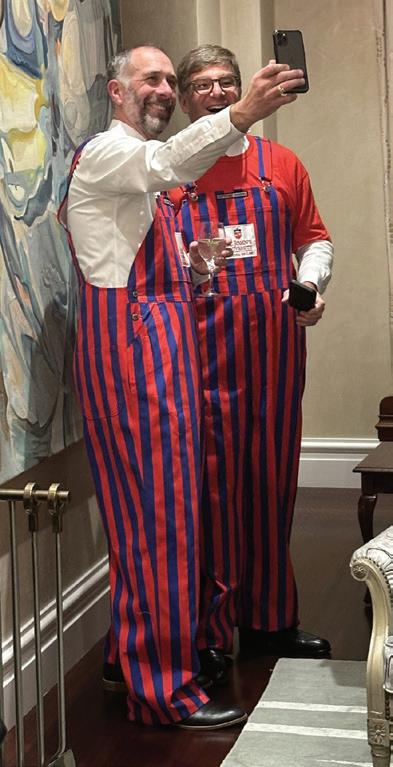

















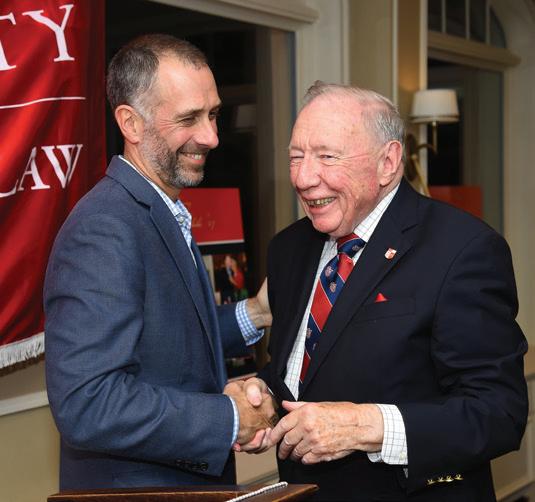
Dear Friends,
Some months ago, we learned that this will be Michael A. Simons’ final year as dean of St. John’s Law. He completes 15 years of service to our beloved Law School, its wonderful students, and an unrivaled alumni community as the longest-serving dean in New York, and one of the longestserving nationwide. But we can’t measure Mike’s deanship in years alone. His impact is manifest in an alma mater that’s warm, welcoming, inclusive, and thriving.
With a clear vision for the institution’s future, Mike worked with the faculty to design and deploy a bold strategic plan anchored by twin goals of academic excellence and student achievement. Today, the Law School is reaping the benefits of that forward thinking, and has never been on more solid footing.
The plan’s success is evident in top graduate employment outcomes; a two-year bar passage rate that’s among the best in the nation; steadily increasing student credentials, marked most recently by a 162 median LSAT and a 3.71 median GPA; and programs and initiatives that affirm the Law School’s commitment to being an ardently and actively anti-racist institution. Under the plan, 19 professors have joined the full-time faculty, bringing a range of gifts as teachers and scholars. Together, they are part of a transformation of the faculty that will propel St. John’s ahead for years to come.
Of course, those gains wouldn’t have been possible without dedicated alumni who partner with Mike and support students as mentors, employers, and donors. That partnership was especially vital as Mike, the faculty, administrators, and students navigated simultaneously an international pandemic and a national reckoning regarding racial injustice. Through Mike’s leadership, St. John’s Law emerged from these dual pandemics whole and stronger.
Change can be difficult. But change from a position of strength is a wonderful opportunity. So, as Mike ends his time as dean and returns to teaching full time at St. John’s, we mark this leadership milestone with gratitude for his selfless service and wish him all the best. We also look forward to welcoming our next dean, Jelani Jefferson Exum, as we sustain, evolve, and celebrate our outstanding Law School together.
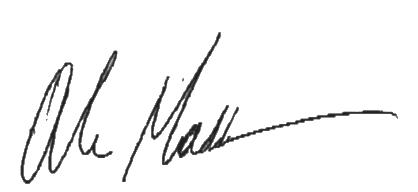 Alain Massena ‘00 President St. John’s Law Alumni Association Board of Directors
Alain Massena ‘00 President St. John’s Law Alumni Association Board of Directors
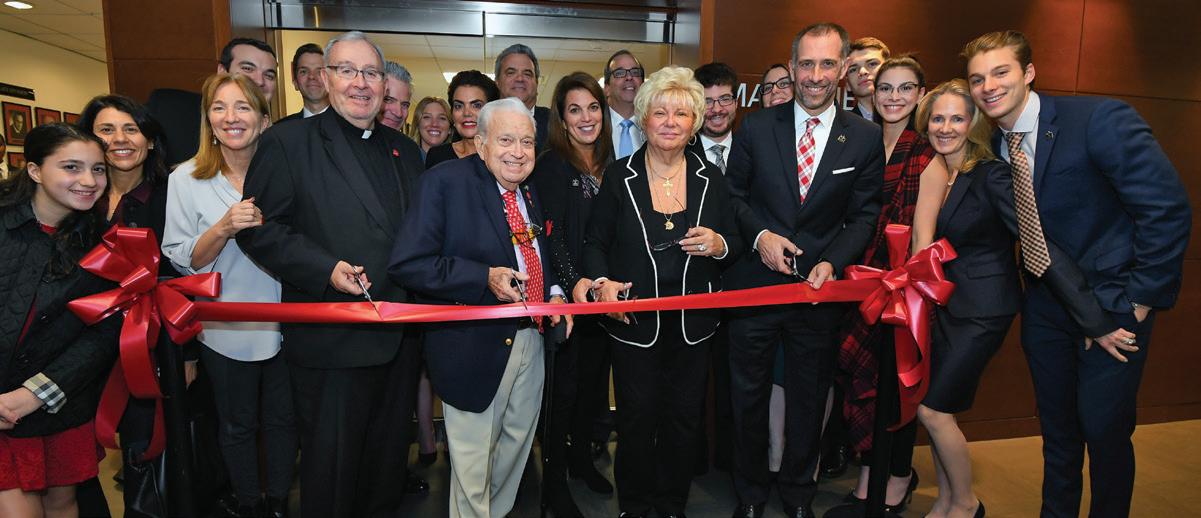


16
17


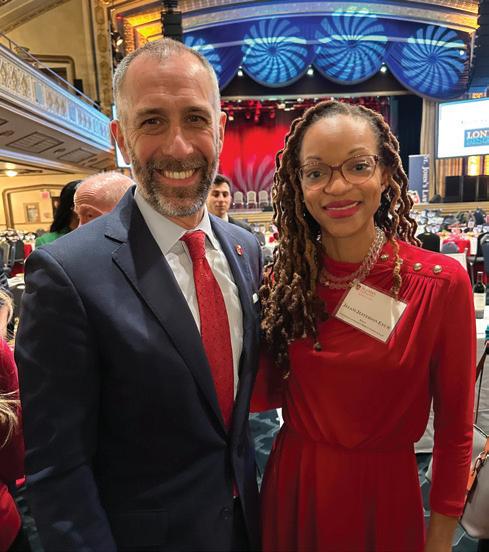
Dear Friends,
Looking back on the last decade and a half, I’m struck by two things: how much the Law School has changed, and how much it has stayed true to its founding mission. Change and continuity. That’s a blueprint for success.
It’s clear that the Law School is thriving, with all-time high 1L class credentials and graduate employment outcomes, a bar passage rate that’s among the best in New York, our most diverse student body ever, and our highest ranking to date. What’s harder to see are all the changes behind those successes—and the people responsible for them.
We introduce you to some of those people in this magazine. They have redesigned our approach to professional development; built our bar preparation and academic support program; expanded our roster of skills-based courses; engaged with alumni and others who hire and mentor students; given generously to support scholarships and initiatives; and worked in countless ways to make the Law School a warm and welcoming intellectual community for all.
Importantly, though, St. John’s Law hasn’t changed so it can be different. It’s changed so it can continue a long tradition of excellence. Since our founding in 1925, the Law School’s mission has been grounded in access, academic excellence, rigorous teaching, civic engagement, professional success, inclusion, and respect for all. Those enduring values have been the bedrock of our success, which is why they’re now codified in our recently adopted mission statement.
As I finish my 15 years as dean and prepare to return to the faculty, I’m thrilled that this blueprint for success—continually striving to improve while staying true to our values—will continue under the leadership of my successor, Jelani Jefferson Exum. She brings a wealth of experience as a law school dean and professor, impeccable credentials, and a deep grounding in the mission that animates St. John’s. I’m excited to be a part of the institution she’ll lead, and I can’t wait to see how St. John’s Law continues to change as we enter our second century.
Onward!

Michael A. Simons
Dean and John V. Brennan
Professor of Law and Ethics

2024
Dean and John V. Brennan Professor of Law and Ethics
Michael A. Simons
Associate Dean for Law School Advancement
Brian J. Woods
Associate Dean for Enrollment and External Relations
Trent Anderson
Editor-in-Chief and Lead Writer
Lori Herz
Copy Editors
Dominique Cendales
Claire K. Pollicino
Art Director
Jill Cuddire
Rose Creative Group
Please send comments to:
Editor, St. John’s Law
St. John’s University School of Law 8000 Utopia Parkway Queens, NY 11439
www.stjohns.edu/law
Copyright 2024 St.
P.S. To read the Law School’s full mission statement, visit bit.ly/StJohnsLawMission or scan the QR code.
After an extensive national search, Jelani Jefferson Exum has been appointed the next dean of St. John’s Law. Currently the Dean and Philip J. McElroy Professor of Law at the University of Detroit Mercy School of Law, she will assume her new position on June 1, 2024.
“The School of Law is a critically important part of St. John’s University,” says University President Rev. Brian J. Shanley, O.P. “The search for the Law School’s next dean yielded an extraordinarily strong pool of finalists, and I’m confident that, in Jelani Jefferson Exum, we have found the right person to lead the Law School forward.”
Dean Jefferson Exum’s appointment was announced by University Provost and Vice President for Academic Affairs Simon G. Møller, who convened the search last summer. “The search process revealed Dean Jefferson Exum to be an effective communicator, an experienced law school leader, an innovator in legal education, and someone who cares deeply about St. John’s mission,” he says.
Before joining the faculty at Detroit Mercy, Dean Jefferson Exum was a professor at the University of Toledo College of Law and the University of Kansas School of Law. She also taught as a visiting professor at the University of Michigan Law School and as a fellow at Tulane Law School. At Toledo Law, she served as the school’s inaugural Associate Dean for Diversity and Inclusion. At Detroit Mercy, the students honored her as Professor of the Year.
When she starts at St. John’s Law as its 10th dean, Dean Jefferson Exum will be the second woman and the first African American to lead the Law School in its nearly 100-year history. She will also hold a named professorship.
“I’m honored to serve as the next dean of St. John’s Law,” says Dean Jefferson Exum. “The Law School’s tremendous legacy of strengthening the legal profession and serving the community by providing a mission-focused education is inspiring. These values have also driven my career and fueled my passion for leadership in legal education. I look forward to working with the St. John’s Law community to build upon the school’s strong foundation and move St. John’s Law into its next century of impact and prominence.”
Prior to starting her academic career, Dean Jefferson Exum earned her undergraduate degree magna cum laude from Harvard College, received a J.D. from Harvard Law School, and held federal clerkships with Hon. Eldon E. Fallon, U.S. District Court, Eastern District of Louisiana, and Hon. James L. Dennis, U.S. Court of Appeals, Fifth Circuit. Engaging with students as a law professor, she has taught Constitutional Law, Criminal Law, Criminal Procedure Investigations, Criminal Sentencing, and Race and American Law, among other courses.
Dean Jefferson Exum’s scholarly work on comparative criminal law and procedure, policing, and the impact of race on criminal justice has appeared in a range of publications. Outside the academy, she has served as a member of the editorial board of the Federal Sentencing Reporter and chaired the advisory board for the Neighborhood Defender Service of Detroit.
“I’m thrilled that Dean Jefferson Exum will succeed me,” says Michael A. Simons, who will return to teaching full time after 15 years as dean. “Throughout her career, she has advanced the Vincentian values that have defined St. John’s Law: access, opportunity, and excellence. Her deep understanding of our
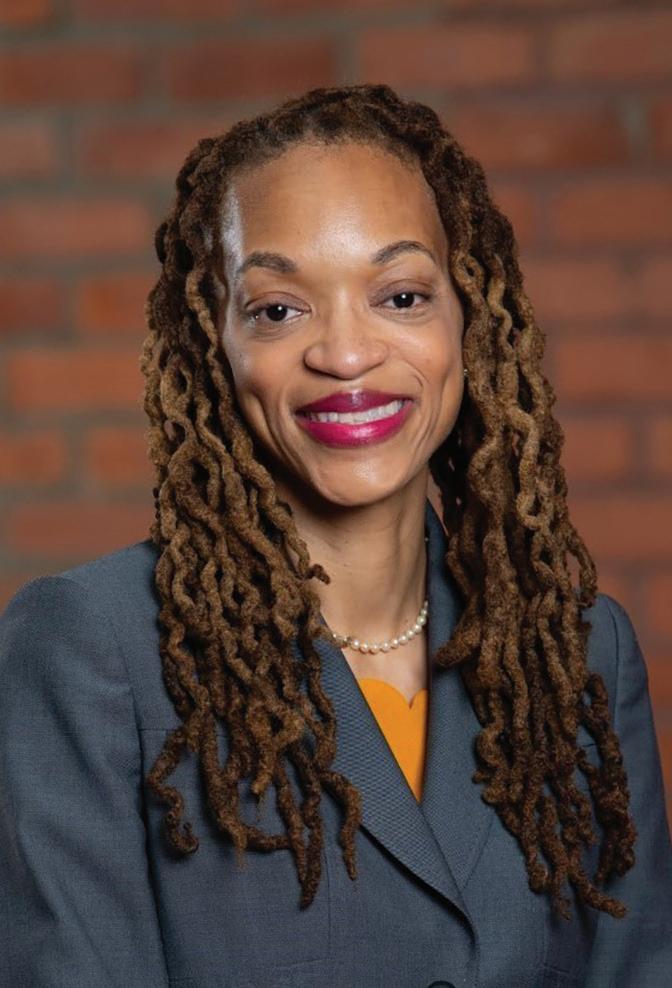
mission, coupled with her extensive experience in legal education and notable scholarly work in criminal law, sentencing, and racial justice, perfectly position her to lead the Law School forward into its second century.”
Queenie Paniagua ’12, a member of the St. John’s University Board of Governors, served on the 18-member Dean Search Committee. “I’m incredibly proud to be a member of a community that was so engaged in selecting our law school’s next dean,” she says. “I have no doubt that, under Dean Jefferson Exum’s leadership, St. John’s Law will continue its ascent among New York’s preeminent law schools.”
St. John’s Law Student Bar Association
President Kiaya Rose Dilsner-Lopez ’24, who also served on the Search Committee, is just as enthusiastic about the selection. “I’m ecstatic that Dean Jefferson Exum will join St. John’s Law,” she shares. “Her life’s work exemplifies St. John’s student-centered approach, along with our commitment to anti-racism in the field of law. I’ll miss Dean Simons’ leadership, but I’m equally excited to welcome Dean Jefferson Exum to our St. John’s family!”
A formal event celebrating Dean Jefferson Exum’s installation as the Law School’s next dean will be held in the fall.
Here are just some of the recent activities and achievements of our outstanding St. John’s Law faculty. To learn more, please visit the Faculty Focus blog produced by Associate Dean for Faculty Scholarship Eva Subotnik at stjohnslawseeinfra.com.
Professor Renee Nicole Allen participated in a virtual panel about the SFFA v. Harvard/UNC Supreme Court decision, where she discussed racialized gas lighting by the Court and the importance of rest as resistance for racial justice advocates. St. John’s named Professor Allen a 2023 Values and Inclusion Program award recipient. The award recognizes employees nominated by colleagues and/or students who demonstrate inclusive excellence by expressing the University’s core values of truth, love, respect, opportunity, excellence, and service.
Professor John Q. Barrett published two essays, “William R. Casto’s Worthy Work on Robert H. Jackson” in the Texas Tech Law Review, and “Justice Lazansky on ‘Repose’ at Chief Judge Cardozo’s New York Court of Appeals” in Judicial Notice, a Historical Society of the New York Courts journal. Professor Barrett lectured in person or online at the Theodore Roosevelt American Inn of Court, the Museum of Jewish Heritage, Touro Law Center, the Robert H. Jackson Center, Chautauqua Institution, Yad Vashem, the Eastern District of New York Chapter of the Federal Bar Association, the Queens County Bar Association, and the New York City Bar Association. He also participated in an Academic Exchange mission to Israel, and he was a guest on the Dissed podcast.
Professor Noa Ben-Asher’s article, “Transforming Legal Sex,” is forthcoming in the North Carolina Law Review. They presented this article at Akron Law School, Utah Law School, and the University of Virginia School of Law. Their book chapter, “Sexual Innocence in Social Justice Movements: A Political Theology,” came out in Enticements: Queer Legal Studies (NYU Press), and their book, Secular Christian Social Justice, is forthcoming from NYU Press.
Professor Chris Borgen spoke on “The Rhetoric and Law of War and Peace: Russia’s Use of International Legal Argument Before and After its Invasion of Ukraine” at Pace Law School’s conference on International Law and the War in Ukraine. He presented his paper, “National Security’s International Empire (or, What We Talk About When We Won’t Talk About Self-Determination),” at a Temple University School of Law workshop on Philippe Sands’ book, The Last Colony. He moderated and participated in a roundtable on military space activities at the Army Futures Command/University
of Texas-Austin Law School First Annual Future of Warfare and the Law Symposium. He also gave a talk on Governance of Space Activities at the U.S. Naval War College’s Cushing International Law Conference. Two of Professor Borgen’s recent publications are a book chapter, “The Law and Diplomacy of Regulating Activities in Outer Space” for the Research Handbook on Law and Diplomacy (Edward Elgar), and “Space and National Security: International Cooperation, Competition, and Commerce,” an essay he co-authored for the 60th Anniversary Anthology of the ABA Standing Committee on the Law of National Security.
Edward Elgar published Professor Robin Boyle’s new book, Teaching Contract Drafting. Her essay, “Didn’t I Cover This in Class: Low-Stakes Technique of Quizzing to the Rescue,” appears in the peer-reviewed Journal of the Legal Writing Institute, and her paper, “Human Trafficking, Cults, & Coercion: The Use of Drugs as a Tool,” is in the peer-reviewed International Journal of Coercion, Abuse, & Manipulation. Professor Boyle presented at the Association of Legal Writing Director’s Biennial Conference on The Beauty of Shorts: Ten Tips on Writing a Publishable Short Piece, and her essay summarizing that presentation was published in Proceedings, an online journal from University of Oregon School of Law.
Professor Miriam Cherry has twice visited the United Nations–International Labor Office (ILO) in Geneva, Switzerland to consult on matters related to a newly proposed international standard for platform work. Along with a sociologist, she has written an ILO report on the status of gig workers in the United States. Professor Cherry presented on several labor and employment panels at the Southeastern Association of Law Schools. As part of a West Academic webinar, she also presented teaching tips for new law professors and provided examples from her book, Contracts: A Real World Casebook
Professor Elissa Germaine participated in a Practising Law Institute program on securities arbitration, where she moderated a panel on Ethical Considerations for Advocates and Neutrals Regarding the Use of AI in the FINRA Arbitration Forum and contributed to written materials supporting the panel. Professor Germaine also participated in a program on The Ethics of Artificial Intelligence for Lawyers for the Public Investors Advocate Bar Association Annual Meeting and authored written materials supporting the panel. She was invited to co-chair the Securities Disputes Committee of the New York State Bar Association’s Dispute Resolution Section.
Professor Elayne Greenberg’s article, “High Anxiety: Racism, the Law, and Legal Education,” was published in the Washington and Lee Journal of Civil Rights and Social Justice. Her Ethical Compass column for the New York Dispute Resolution Lawyer, “Hats for Sale: Efficiency, Economics, and Process Integrity,” explores ethical considerations when a neutral is asked to serve as mediator and arbitrator on the same case. Professor Greenberg’s article, “Bridging the Legal Writing Skills Gap: Pre-Mediation Statements,” appears in the fall issue of Perspectives: Teaching Legal Research and Writing and addresses the importance of including settlement-focused writing in 1L legal writing courses.
Professor Peggy McGuinness’ co-authored book, The Research Handbook on Law and Diplomacy (Elgar), received the American Branch of the International Law Association’s ABILA Practitioners Book Award. To promote the book, she led panel discussions on Legal Advisors and the Lawyer-Diplomat at the Washington Foreign Law Society and on Diplomacy of the Rule of Law at the New York City Bar Association. Professor McGuinness also gave a talk on Law and Diplomacy at Utrecht University Law School in the Netherlands and offered keynote remarks on Law and Diplomacy: From Practice to Theory and Back Again at a conference of the European Union EUDIPLO research project hosted at Groningen University.
Professor Mark Movsesian’s article, “The New Thoreaus,” appeared in a symposium issue of the Loyola University Chicago Law Journal, and his review essay, “Religious Liberty and the American Founding,” appeared in the Journal of Law and Religion. Shorter pieces appeared in First Things and the Canopy Forum. Professor Movsesian participated in an online symposium, The Religious Freedom Restoration Act at 30, sponsored by Emory Law School, and a panel, Free Speech vs. Anti-Discrimination: A Conversation on 303 Creative, at the annual Federalist Society Faculty Conference.
The Cornell Law Review has published Professor Abel Rodríguez’s article, “Lethal Immigration Enforcement,” which addresses racialized violence within the immigration system. Prior to publication, he presented his research for the piece at the Emerging Immigration Scholars Conference at the George Washington University Law School.
Professor Rosemary Salomone was awarded the Premio Pavese in non-fiction for her book, The Rise of English: Global Politics and the Power of Language (Oxford University Press). The award is named after the renowned Italian author, poet, and translator Cesare Pavese. Professor Salomone’s book was the topic of an interview with David Priess on the Chatter podcast. The paperback edition, with an updated preface, has since been published. Her commentary on pending legislation in the Netherlands, “Student Internationalization Plan May Be a Model for Others,” appeared in University World News. She also presented a paper on “Transformative Constitutionalism in South Africa: New Updates in the Narrative on Language Rights in Education” at the South African Education Law Association Conference.
Professor Eva Subotnik presented her co-authored article, “Copyright’s Capacity Gap” (U.C. Davis Law Review), at the Eighth Copyright Scholarship Roundtable hosted by the University of Pennsylvania Carey Law School, and at the Fourth Annual Art Law Works-in-Progress Colloquium hosted by New England Law. She presented another co-authored article, “What the Warhol Court Got Wrong: Use as an Artist Reference and the Derivative Work Doctrine” (forthcoming Columbia Journal of Law & the Arts), at day-long conferences at Columbia Law School and NYU School of Law.
Professor Cheryl Wade’s co-authored commentary on feminism and limited liability and her co-authored chapter titled “The Importance of Incorporating Feminist Perspectives in Corporate Law” were published in Feminist Judgments: Corporate Law Rewritten (Cambridge University Press). Her invited chapter, “Formalizing Compliance to Reduce Board Exposure to Civil and Criminal Liability,” was published in The Law of Fraternities and Sororities (Carolina Academic Press), and her discussion of anti-Black racism was featured on the Fiasco: Vigilante podcast. In addition to being a presenter and facilitator at the Academic Forum on the Intersection of Race and Business Law at the University of Pennsylvania Carey Law School, Professor Wade was a panelist at two conferences: Financial Regulators Under Siege at Loyola University School of Law Center for Business Law, and Law, Community, and Social Justice at the University of Houston Law Center.
Introducing the Denise ’90 and Michael ’91 Mattone Center
In December, Dean Michael A. Simons announced that the Center for Law and Religion at St. John’s Law will be named in honor of alumni Denise Melillo Mattone and Michael X. Mattone, in recognition of their transformative gift to endow the Center’s activities. The multimillion-dollar gift will allow the Center to offer new educational programs and expand its impact as a hub for exploring issues of law and religion in the United States and around the world.
“People continue to care deeply about the relationship between church and state, and the questions aren’t getting any easier,” Dean Simons says. “These questions are crucial for us to examine as members of a Catholic and Vincentian institution and as American citizens. I’m so grateful to Denise and Michael for their generosity and commitment, which will allow the Center to contribute even more to this vital area of the law.”
The newly named Denise ’90 and Michael ’91 Mattone Center for Law and Religion will offer educational opportunities, including innovative coursework, a visiting scholars program, and academic workshops and conferences at St. John’s campuses in New York, Paris, and Rome. It will also host programs for St. John’s alumni and the wider public, including podcasts, videos, and live events on pressing church-state issues.
“For 13 years, the Center has had an impact in the legal academy through our conferences, podcasts, and other programs,” says Center Director Mark Movsesian. “Denise’s and Michael’s gift will allow us to have even more influence. I’m grateful for their confidence in us and honored to be associated with a center that bears their names.”
Another major benefit of the Mattones’ gift, Professor Movsesian shares, will be increased funding for student fellowships. “Our student fellows play an important role in the Center, working on our Law and Religion Forum blog, producing content for our Legal Spirits podcast, tending to our social media feeds, and helping with Center events,” he says.
“Denise’s and Michael’s generosity will help us continue to provide this opportunity to our students, enhancing their learning and the intellectual life of the Law School.”
Animating St. John’s Vincentian mission, the Mattone Center for Law and Religion will also continue its service to the campus community. “I am deeply grateful to Denise and Michael Mattone for their generous commitment to the School of Law’s Center for Law and Religion,” says Rev. Brian J. Shanley, O.P., Ph.D., President of St. John’s University. “I am especially pleased that Michael was elected earlier this year to serve as a member of the University’s Board of Trustees, and that he and Denise have continued to share the gifts of their time, talent, and philanthropy with St. John’s, our law students, and faculty. Naming the Center for Law and Religion in their honor is a fitting recognition for all that they have done, are doing, and will continue to do for our University.”
As the Center starts this new chapter, the Mattones are delighted to be part of its progress. “Denise and I are pleased to support the Center,” Michael Mattone says. “It plays a key role in providing a forum for scholarly dialogue on the interplay of law and religion, and we’re eager to see that important work evolve and shape discourse nationally and globally.”
Denise Melillo Mattone began her legal career in public service, working as an Assistant District Attorney in Brooklyn and, later, as Law Secretary to Hon. Jeffrey D. Lebowitz in the New York courts. She then moved into private practice. Denise has supported her community through St. Brigid’s Attic, Saint Christopher-Ottilie Family of Services, and the Catholic Faith Network, among other organizations.
Michael X. Mattone is Chief Executive Officer of Mattone Investors, LLC. He is a member of the St. John’s Law Alumni Association Board of Directors and sits on
the St. John’s University Board of Trustees. Supporting the wider community, Michael serves on the boards of the Catholic Faith Network, New York-Presbyterian Queens Hospital, Queens Economic Development Corporation, Jamaica Center Business Improvement District, and Queens Boy Scouts. He has received the Order Sons and Daughters of Italy in America’s Golden Lion Award, Catholic Charities of Long Island’s Caritas Award, and St. John’s Spirit of Service Award. He is also a Knight of the Holy Sepulchre.

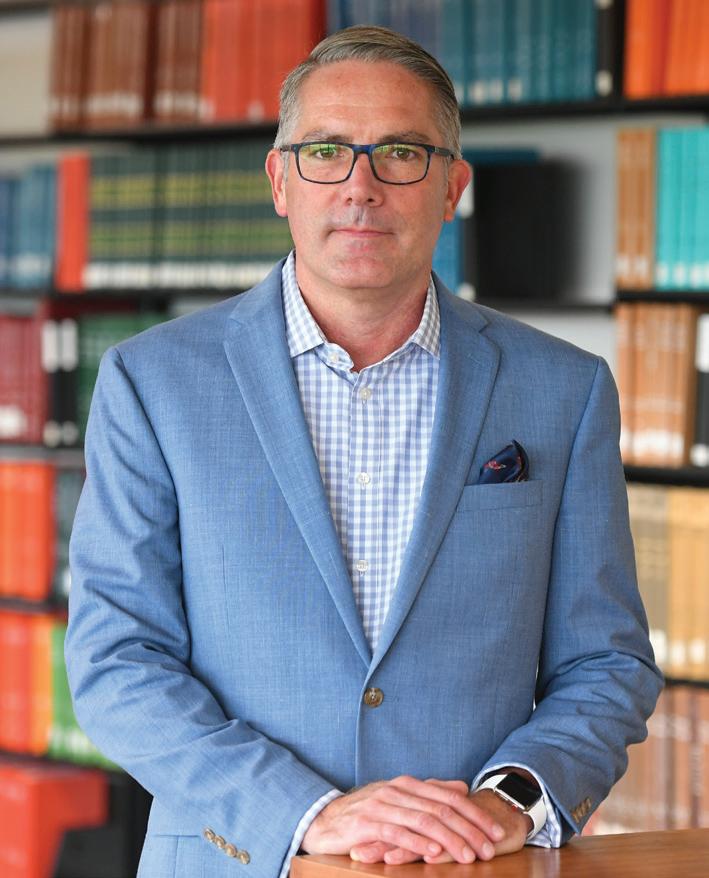
They also work hard to foster a sense of community among our students, alumni, and friends. For instance, the MarComm team is in charge of broadcasting—across multiple channels—how our students and alumni excel. They share how our institution is growing through innovative courses and programs, while maintaining a long and proud tradition of educating impactful lawyers. Communicating in this way, we inspire alumni and others to give their time and talents generously. That support helps to sustain the Law School and attract even more talented students, faculty, and staff.
LH: How does St. John’s approach to J.D. admissions set us apart from other law schools?
legal practice. For lawyers interested in advancing their careers in specific fields, our Real Estate LL.M., under the auspices of our Mattone Family Institute for Real Estate Law, and our Bankruptcy LL.M., overseen by our Center for Bankruptcy Studies, are great options. They are both highly regarded, niche programs that bring practitioners to St. John’s Law to boost their practical knowledge and skills and accelerate their careers.
LH: How has law school marketing and communications evolved in your time at St. John’s?
Trent Anderson has been a lead administrator at St. John’s Law since 2015. As Associate Dean for Enrollment and External Relations, he now heads the Law School’s J.D. Admissions, Graduate Studies, and Marketing and Communications teams. Here, he sits down with Director of Strategic Communications Lori Herz to talk about his pivotal work.
LH: You wear multiple hats as a Law School administrator. What do your different roles have in common?
TA: The common thread is our students. Wearing my admissions hat, I help recruit students who are right-fit for St. John’s Law. With a median LSAT of 162 and a median GPA of 3.71, the current 1L class has the highest incoming credentials of any class in our history. All of our students come to us with a diverse range of experiences and perspectives, and they animate our founding mission of opening doors to people facing educational, social, or economic challenges. The J.D. Admissions, Graduate Studies, and Marketing and Communications (MarComm) teams I lead help to bring these right-fit students into our warm, welcoming, and inclusive Law School.
TA: Students always tell us that they chose St. John’s over other law schools because of our people. Being here just feels different. Our students are competitive, but not cutthroat. They are incredibly hardworking, while still valuing their downtime. They are individuals who are diverse in every way, but they find common purpose in fostering community at the Law School. Our J.D. admissions team also sets us apart. It’s excellent all around. We use a holistic review process to identify applicants who will benefit from a St. John’s legal education and contribute to our community. The admissions team is unmatched in finding people who go on to succeed academically and professionally, and who animate our Vincentian mission of serving the greater good.
LH: We offer LL.M. programs for foreigntrained lawyers, as well as an acclaimed Bankruptcy LL.M. and a new Real Estate LL.M. How do these programs serve our students and the wider profession?
TA: New York is a global center for law, and it’s where many attorneys want to practice. So, St. John’s is a very attractive option for foreign-trained lawyers who want to prepare for the New York Bar Exam. In addition to offering programs for students who want to take and pass the Bar Exam, we partner with schools in Asia, the Americas, and Europe to train their students in transnational
TA: Social media has been a gamechanger. Ten years ago, I wouldn’t have imagined giving a law school tour to a capybara. Now, that tour is one of our most popular social posts (check it out on TikTok). We know that prospective students, current students, and alumni use Instagram, TikTok, LinkedIn, Reddit, and other social platforms to get information, to educate themselves, to gain inspiration, and to be entertained. So, our MarComm team shares content about St. John’s Law that’s relevant to those audiences as part of a larger marketing and communications strategy. But it’s not all about business. Social is also where we have some fun, and show off the personality of our Law School and the people who work here.
LH: Jelani Jefferson Exum starts as our new dean in June. And, in 2025, we’ll celebrate the Law School’s 100th anniversary. What excites you most about your work ahead?
TA: Mike Simons did an exceptional job leading the Law School through some difficult times for legal education over the past decade, and he has created a rocksolid foundation for our future. Incoming Dean Jefferson Exum’s knowledge, experience, and skills make her the perfect person to build on that foundation. Partnering with her, and with our leadership team, is a dedicated community of alumni that spans the globe. There is no better alumni base than the one we have here at St. John’s Law. I’m always awed by their generosity as they give, mentor, and hire, and I look forward to helping them, my colleagues, and our students enjoy our next 100 years of success!

Since opening its doors six years ago, St. John’s Mattone Family Institute for Real Estate Law has built one of the premier J.D.-level real estate law programs in the nation. Now, it’s expanding on that foundation of success with the launch of the Law School’s Real Estate LL.M. program.
“St. John’s has created a program that’s tailor-made for U.S. and international attorneys who want to be in New York City, the global epicenter of real estate development, investment, and finance,” says Mattone Institute Director Robert Sein ’03, who leads the new LL.M. program with Associate Director of Graduate Academic Programs Margie Townsend. “Real estate practice offers attorneys the opportunity to positively influence the places where people live, work, and play on a daily basis. We’re excited to further our mission and help prepare even more students who want to embark on, or advance, their careers in this dynamic practice area.”
While completing 24 credits full time or part time, Real Estate LL.M. students take an array of advanced real property law courses; explore issues impacting the real estate bar and industry at special events; forge connections and friendships with St. John’s Law alumni in the field; gain experience and skills hands on through externships and internships; and get individualized career counseling from day one at St. John’s Law.
Anchoring the LL.M. program’s offerings is a distinguished faculty that draws on years of real-world practice to enhance teaching and learning in the classroom. “I’m thrilled to be able to offer my knowledge and expertise to the LL.M. students, and will greatly enjoy watching them develop an understanding of the varying concepts in real estate law,” says Donna-Marie Korth ‘83CBA, ‘86L. My focus in teaching is not only on the substance of the course, but also on the practical and ethical aspects, particularly geared to real estate practitioners.”
As a Partner in the Coop/Condo and Litigation Practice Groups at Certilman Balin, and as a member of the Mattone Institute Advisory Board, Korth also understands that St. John’s Real Estate LL.M. program is launching at just the right time. From the industry’s postpandemic recovery to office building vacancies, a dearth of affordable housing, and new legislation at the state, city, and local levels, there are challenges to address and opportunities to seize.
“These compelling matters need to be given thoughtful consideration, and the LL.M. program’s intense focus on all aspects of real estate is highly relevant and critical at this juncture,” Korth says. “Our students will be able to study and analyze existing and emerging issues, trends, and legislation in order to develop creative solutions. This advanced program will no doubt produce new leaders in the real estate industry, who will, in turn, shepherd in positive change and growth in this vitally important field. I look forward to seeing what they will do, and the mark each will leave on our profession.”







In this special section, we introduce you to Law School leaders who are hard at work helping St. John’s Law and our students thrive. Together with colleagues around the building, they’re creating a blueprint for success that will carry us into our next century of educating lawyers who excel in the profession as they serve the greater good.


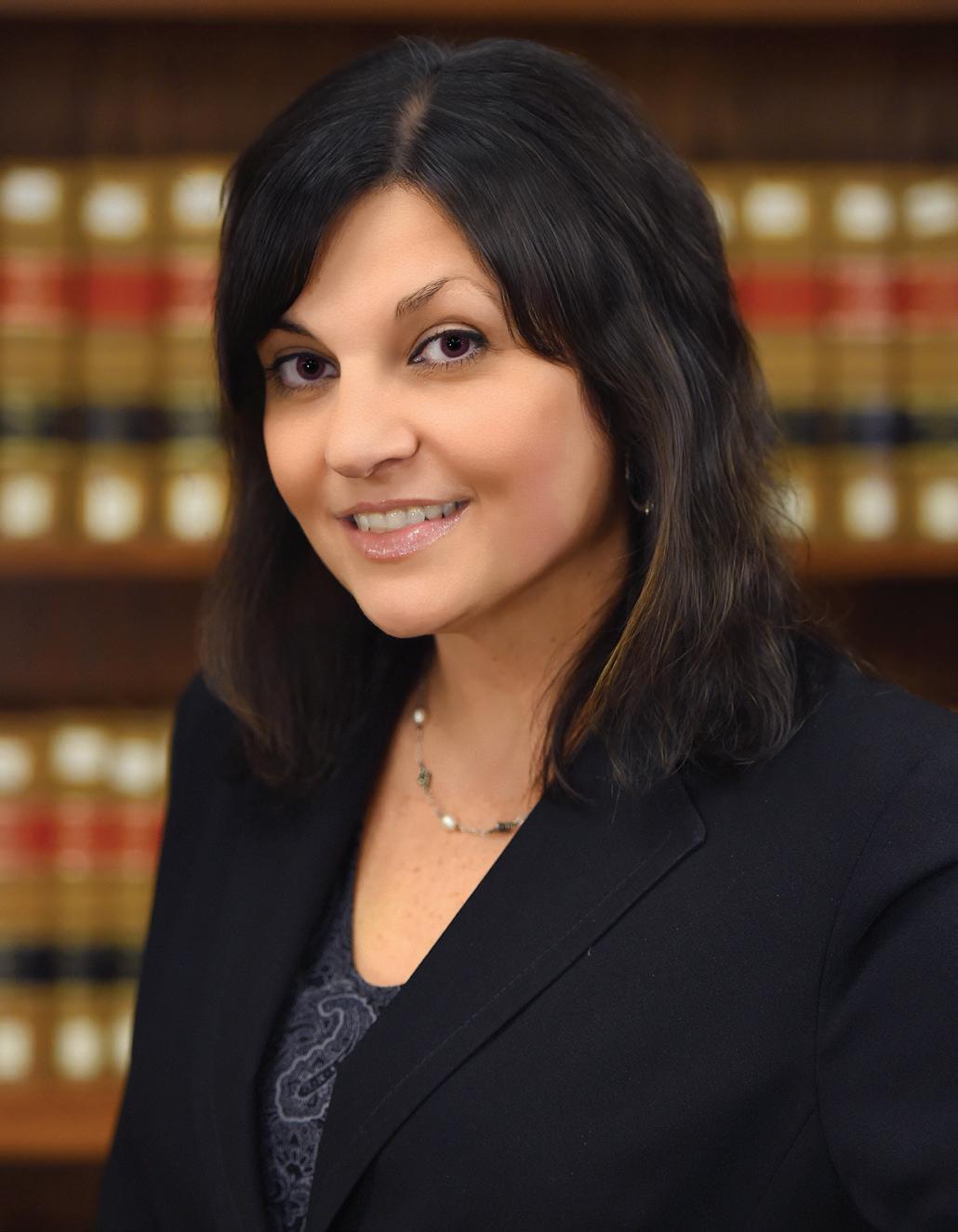
I’m an alumna, so returning to St. John’s Law over 20 years ago to work in the Career Development Office (CDO) was like coming home. I now lead a hardworking, 14-person team that takes an individualized, proactive, and integrated approach to career development that has helped recent graduates achieve a 92% employment rate in full-time, long-term, “gold standard” law-related jobs.
It’s an individualized approach in that, from day one, every student is assigned their own CDO counselor. It’s proactive because our career counselors understand that law students are busy. So, if a student hasn’t reached out in a while, their counselor will check in to make sure they are on track. Counselors also tell students about right-fit career opportunities.
Last but not least, it’s an integrated approach. CDO collaborates with colleagues around the building, with faculty members, and with St. John’s Law alumni to make career connections. Those collaborations enhance CDO’s programs and initiatives, including our outreach to prospective employers looking to hire our students and graduates.
We also tap our employer and alumni networks to run the Lexy and Samuel S. Lionel ‘40, ‘10HON Externship Program. Directed by Tom Blennau ‘02, the program places students in various practice settings. Alumni support the annual Summer Public Interest Fellowship Program and Spring Break Service Program that CDO offers through the Public Interest Center, which is led by Jeanne Ortiz-Ortiz. They partner with us to give 1Ls a Spring (Break) Into Law Practice Experience, and they participate in Mentor Connect, a student mentoring program directed by CDO team member Helena Quinn.
Our suite of CDO offerings also includes the Mattone Family Institute for Real Estate Law, directed by Rob Sein ‘03, and the Center for Bankruptcy Studies, led by Laura Schwartz ‘90. Both centers introduce St. John’s Law students to cutting-edge issues and leading practitioners. Expanding the reach and impact of those centers are our acclaimed Bankruptcy LL.M. program and new Real Estate LL.M. program. So, at both the J.D. and LL.M. levels, CDO is opening doors every day to exciting and rewarding careers in the law.
I started working at St. John’s almost 30 years ago, and I’ve served on the Law School’s leadership team for over 20 years. I often share that I’ve never once experienced the “Sunday blues.” I love what I do, and I consider it a privilege to be part of this wonderful community.
Being of service to students, faculty, alumni, administrators, and staff is the through line of my current roles at St. John’s Law. As Chief of Staff, I work closely with the dean and with my colleagues in administrative leadership as I manage a range of special projects and initiatives. On any given day, you might find me overseeing physical improvements to the building, helping to recruit talented individuals for administrative and staff positions, or doing a run of show for a major Law School event.
I also head the Law School’s non-academic operations, as conducted by our Dean’s Office, Facilities, Faculty Support, Information Technology, Office Services, Special Events, and Special Projects teams. All of those teams—and each and every member of them—are integral to the success of our institution. Leading people who help to sustain this special community is very rewarding. Because of them, every day is a new day that motivates and inspires me.
As I undertake my dual leadership roles, they afford me a unique view of the genuine care that’s a driving force behind the work we do at St. John’s Law. That care sets us apart from other law schools, and I’m proud to provide an environment where students get the support they need to grow as professionals. The empathy, compassion, and positivity they experience help them chart a path to success. It’s a joy to watch them thrive.
Looking ahead, I’m excited to celebrate the Law School’s 100th anniversary. I love a good party! I’m also optimistic about our future as we prepare to welcome our new dean. We know who we are and, with a clear focus on helping students and alumni excel, we’re ready to begin our next chapter.
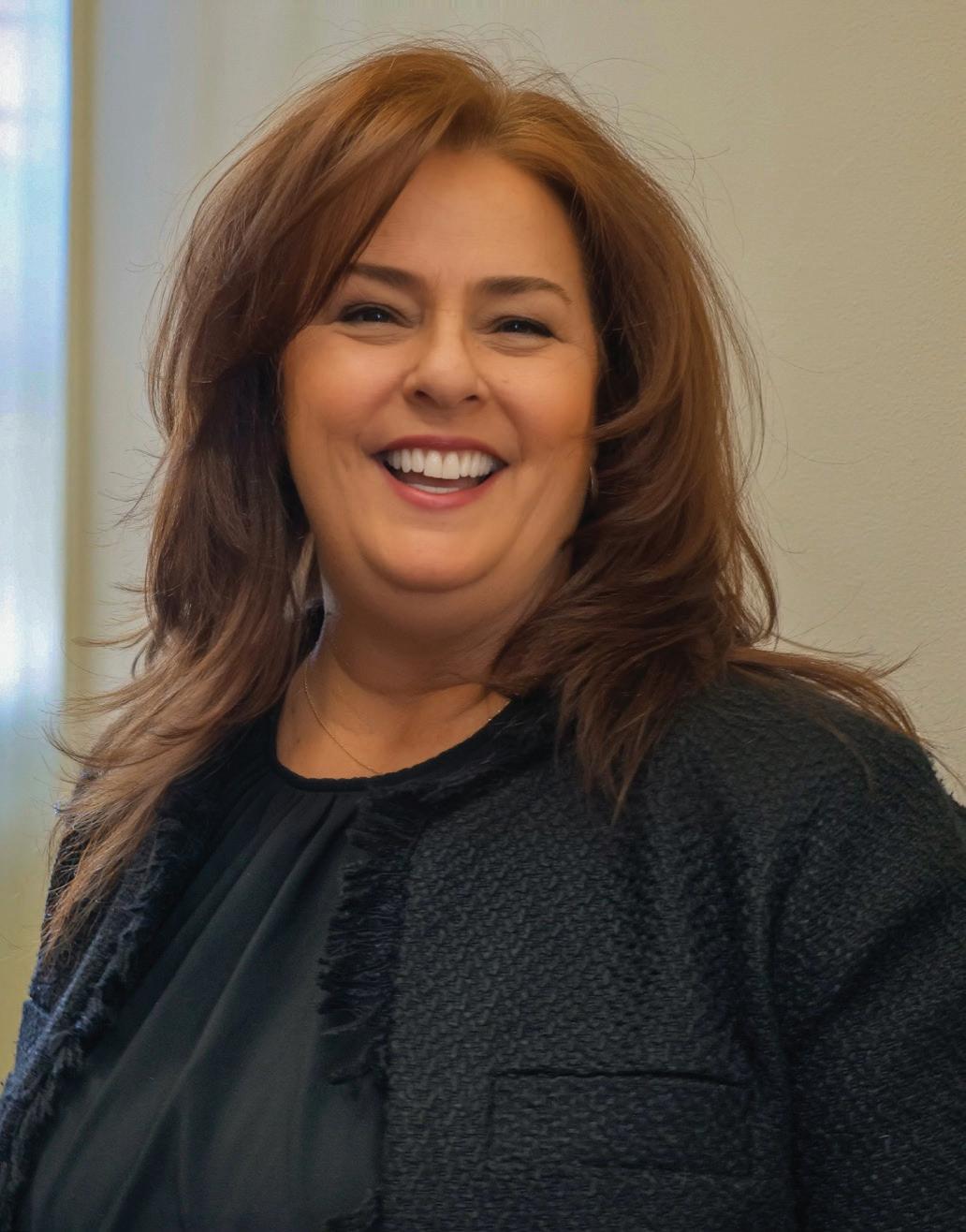


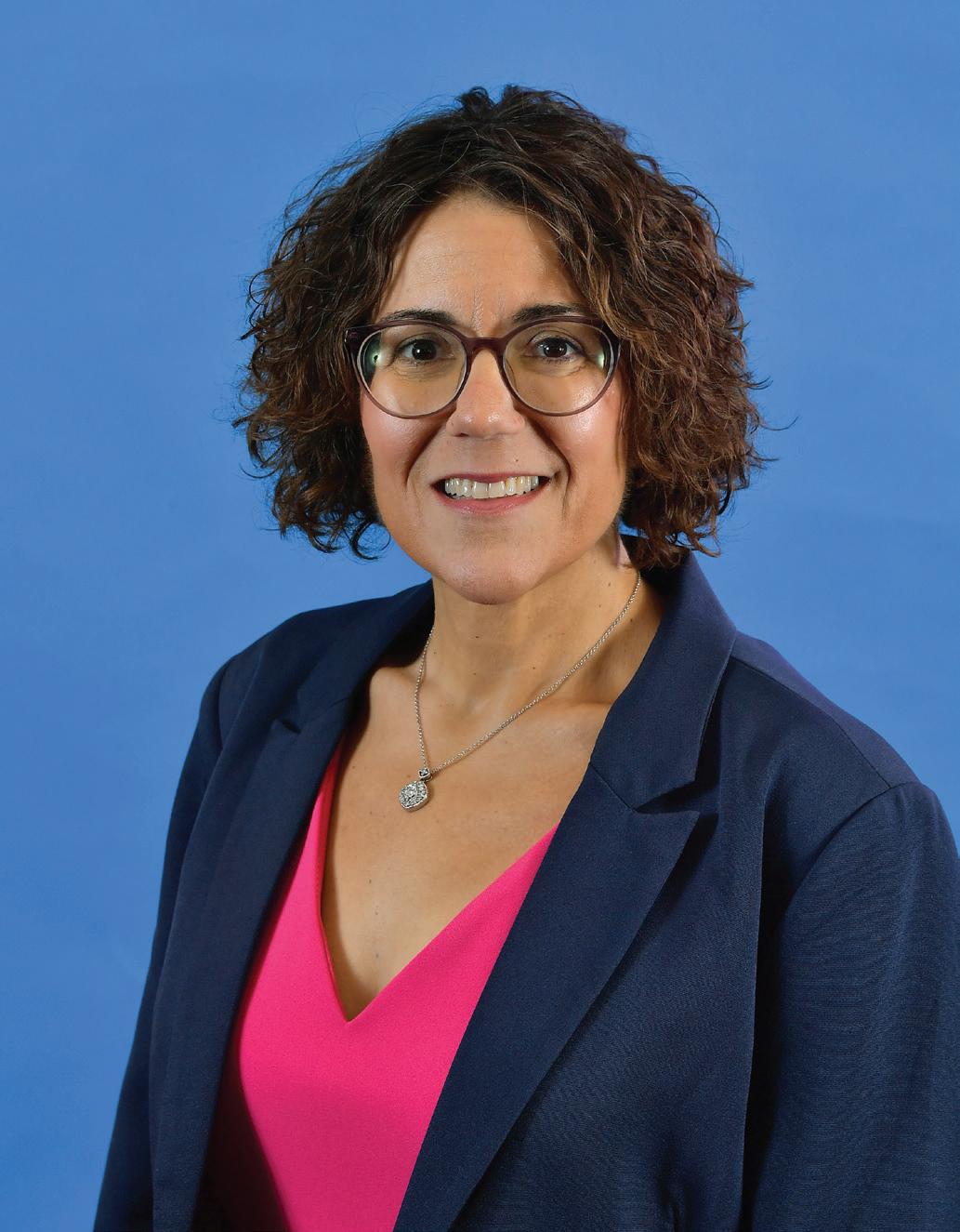
There’s a saying that “teaching is only teaching if students are learning.” The question, then, becomes: How do we know that students are learning? Or, reframed for law school professors and administrators: How do we know that students are learning what they need to learn to be successful and upstanding lawyers?
Answering that question is central to my work as Assistant Dean for Assessment at St. John’s Law. Generally, in any industry, profession, or educational program, you have standards to meet and outcomes to achieve. At some point, you need to evaluate if you’re meeting those standards and achieving those outcomes. That’s what we do in law school assessment.
Several years ago, pursuant to requirements set out by the American Bar Association—which oversees U.S. law school accreditation—the St. John’s Law faculty adopted a multi-year assessment plan. That plan articulates seven student learning outcomes that reflect our goals as a law school, as well as our Vincentian mission of serving the greater good. They can be summarized as: (1) knowledge of the law; (2) legal analysis, reasoning, and problem-solving; (3) factual development and legal research; (4) communication; (5) professional responsibility and ethics; (6) interpersonal skills; and (7) engagement at a scholarly level.
Along with colleagues on our assessment team, each year, we assess one learning outcome using a combination of direct and indirect measures. It’s a big undertaking, but assessment demonstrates that we prioritize student success. It holds us accountable to those who entrust us with their legal education and professional development. If we identify problem areas, we address them strategically—either with new curricular design, different pedagogical approaches, better assessment techniques and tools, or a combination of those solutions.
I’m very excited to work with my colleagues as we continue to build a strong assessment culture. Teaching is my passion, and helping students learn the law and become excellent attorneys means the world to me. I look forward to expanding my knowledge of assessment and applying that insight in service to our students and to St. John’s Law.
Our 10 in-house and partner clinics are integral to the student experience at St. John’s Law, and the vast majority of our students take at least one clinic as part of their legal education. One of the main goals of the Law School’s clinical program is to turn out ethical, professional, and dedicated advocates. In the clinics, we discuss what it means to be a lawyer, what our role is in society, and how we can use our power to help effectuate change and seek justice for underrepresented and marginalized individuals and communities.
Most clinic work happens in New York courts where people often appear without counsel. As they represent clients for one or two semesters, students see how their clients and others are treated—not just by lawyers, but by court personnel and judges. They witness firsthand the inequity and imbalance of power that taints many legal proceedings. It’s a very eye-opening experience for them.
Our students also learn how cultural diversity and cultural sensitivity factor into legal practice. While the majority of our clinic clients live in Queens, they come from all over the world. So, students have the opportunity to work with people who are different from them. In the clinic seminars, we talk about how diverse cultural norms and practices inform that work. We also discuss how to find commonality while navigating the attorneyclient relationship, to build trust and to provide the best legal representation.
Another important point we try to get across to students is that all of the things they’re learning about and reflecting on in the clinics will stay with them. As clinicians, we understand that many of our students will go into private practice. But that doesn’t minimize the importance of doing clinic work, learning best practices, and seeing the realities of our legal system. Wherever they go from here, students will draw on their clinic experience as they advocate for clients and make a difference in some meaningful way.
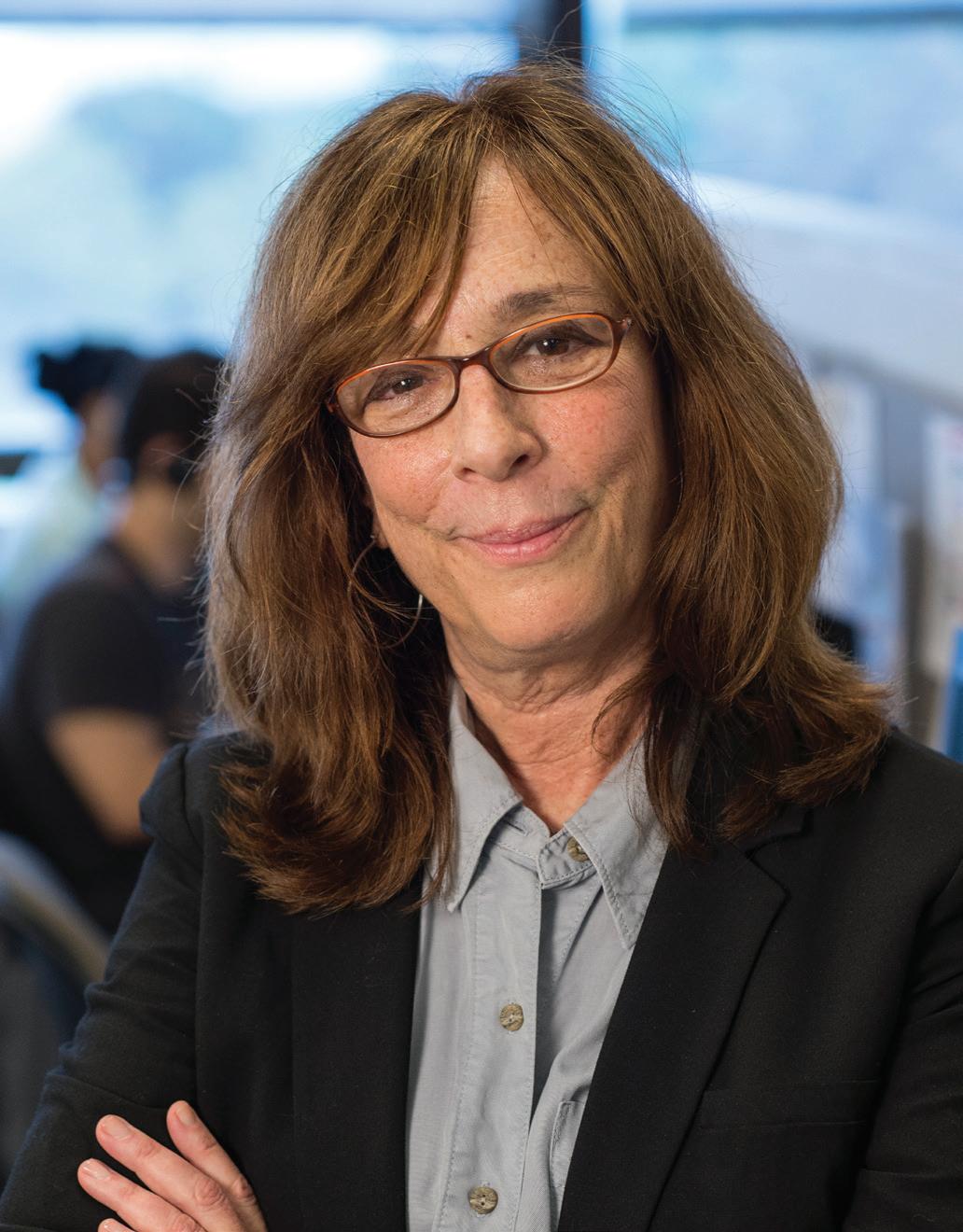


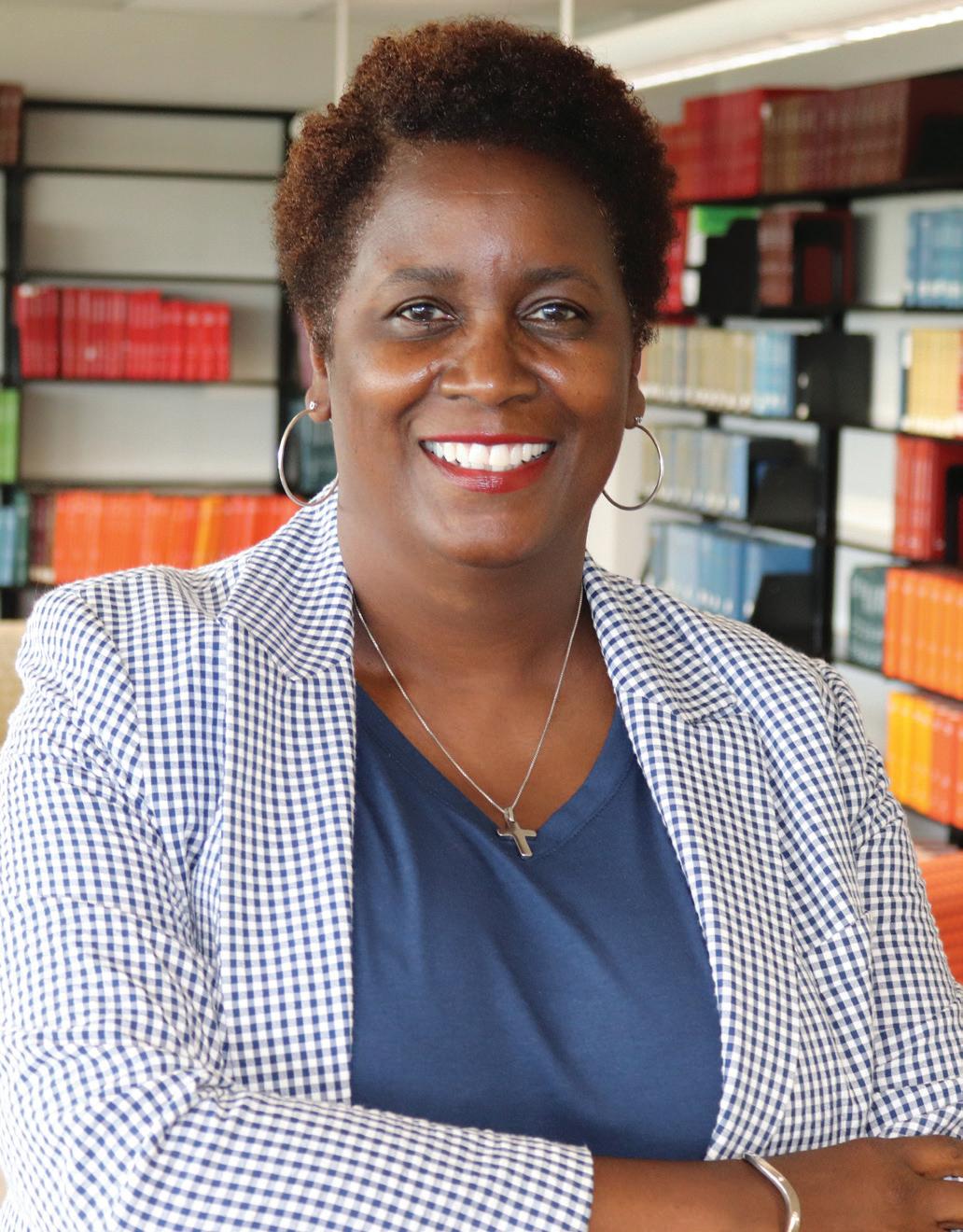
As the Law School’s Assistant Dean for Diversity, Equity, and Inclusion (DEI), I help to create community for our students of color, and for other students from historically marginalized groups. I’m here to make sure that everyone has a voice and representation in our institution.
Building community is an all-hands effort in our “if you can see it, you can be it” reality. I ask upper-level students to serve as mentors, so new students know someone at St. John’s from the outset. At welcome events, incoming students enjoy food representing their diverse cultures, find common bonds, and celebrate difference. Connecting students with Law School alumni who understand their lived experience also builds a sense of belonging. The message is, “You’re not the only one. You’re not the first one. You can do this!”
Law School events are another source of community. We host a Diversity & Inclusion Gala and an Anti-Racism Day annually. This year, we’re celebrating our Black Law Student Association’s 50th anniversary, which is a major milestone. Our Law School Alumni Association has an active Alumni of Color Chapter that presents a range of programs. I also oversee a two-part DEI orientation for 1Ls. They learn about microaggressions and allyship and gain valuable tools and resources as they start their legal studies.
Not surprisingly, our students of color, those who identify as LGBTQ+, and others with marginalized identities share that they feel more at home learning from an increasingly diverse St. John’s Law faculty. It’s empowering to have someone up front who understands the people in the seats. Outside the classroom, our students connect around common interests as members of Student Bar Association groups. Most of those groups have a DEI lead who makes inclusion a priority.
Behind all our efforts to build community is a team of Law School administrators and faculty who understand that DEI has to be part of everything we do. It’s central to our mission of serving the greater good, and to fostering a fully representative legal profession. I’m proud to lead that mission-critical work.
I was delighted to join the Law School’s leadership team last summer as Vice Dean for Academic Affairs. In this new role, among other responsibilities, I support our faculty as they develop courses, teach classes, and advise students. I oversee our Registrar’s Office, which is led by the incomparable Theresa Hallet and her hardworking team. I also ensure that our co-curricular programs—student-run journals and the Dispute Resolution Society, Frank S. Polestino Trial Advocacy Institute, and Moot Court Honor Society—are equipped to enrich the student experience.
It’s a job with a lot of moving pieces, but I don’t operate in a silo. I work closely with wonderful colleagues to achieve a common goal of academic excellence. That excellence is rooted in core classes that teach the foundations of the law; in innovative electives that hone lawyering skills; in clinics that assist underserved New Yorkers; in a robust bar exam preparation program that’s fully integrated into the curriculum; and in many other offerings.
As much as we value academic excellence, we also prioritize student success. Every student can be successful when they feel they belong at the Law School and in the profession. So, a focus of my work as Vice Dean is to help our students experience themselves as vital community members while learning in the classroom, participating in co-curricular programs, and gaining experience in the field.
We also know that our students’ sense of belonging is tied to their developing professional identity. So, the message we embrace and impart to them is this: “You don’t have to fit some preset mold.” Through their years at St. John’s, by design, we give students lots of space to try things out, to learn what fits their style and their values, and to build confidence as aspiring lawyers.
Watching our students excel as they learn the law, claim their place at St. John’s and in the wider legal community, and become the professionals they want to be is the best part of my job, and why I look forward to coming to work every day.
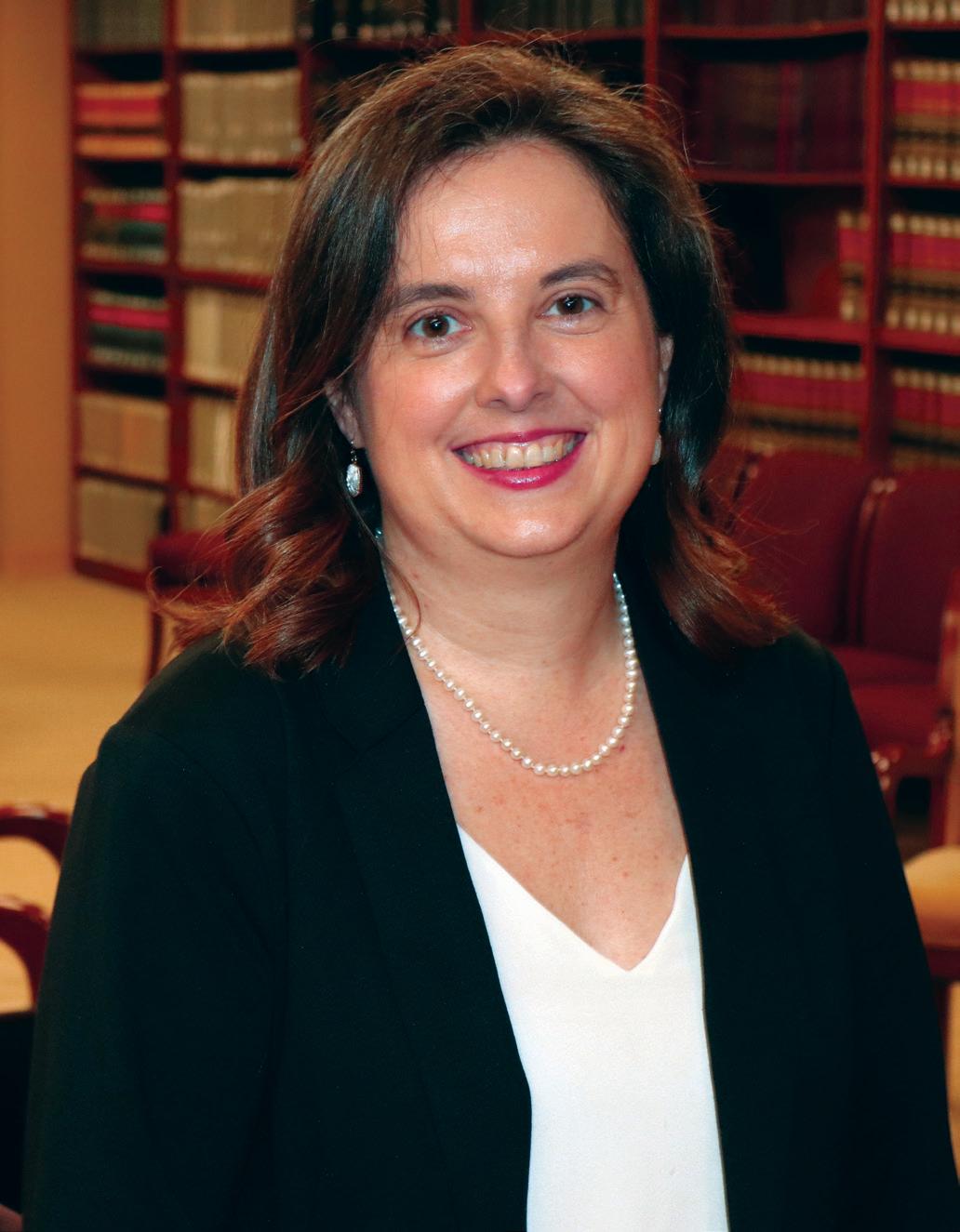

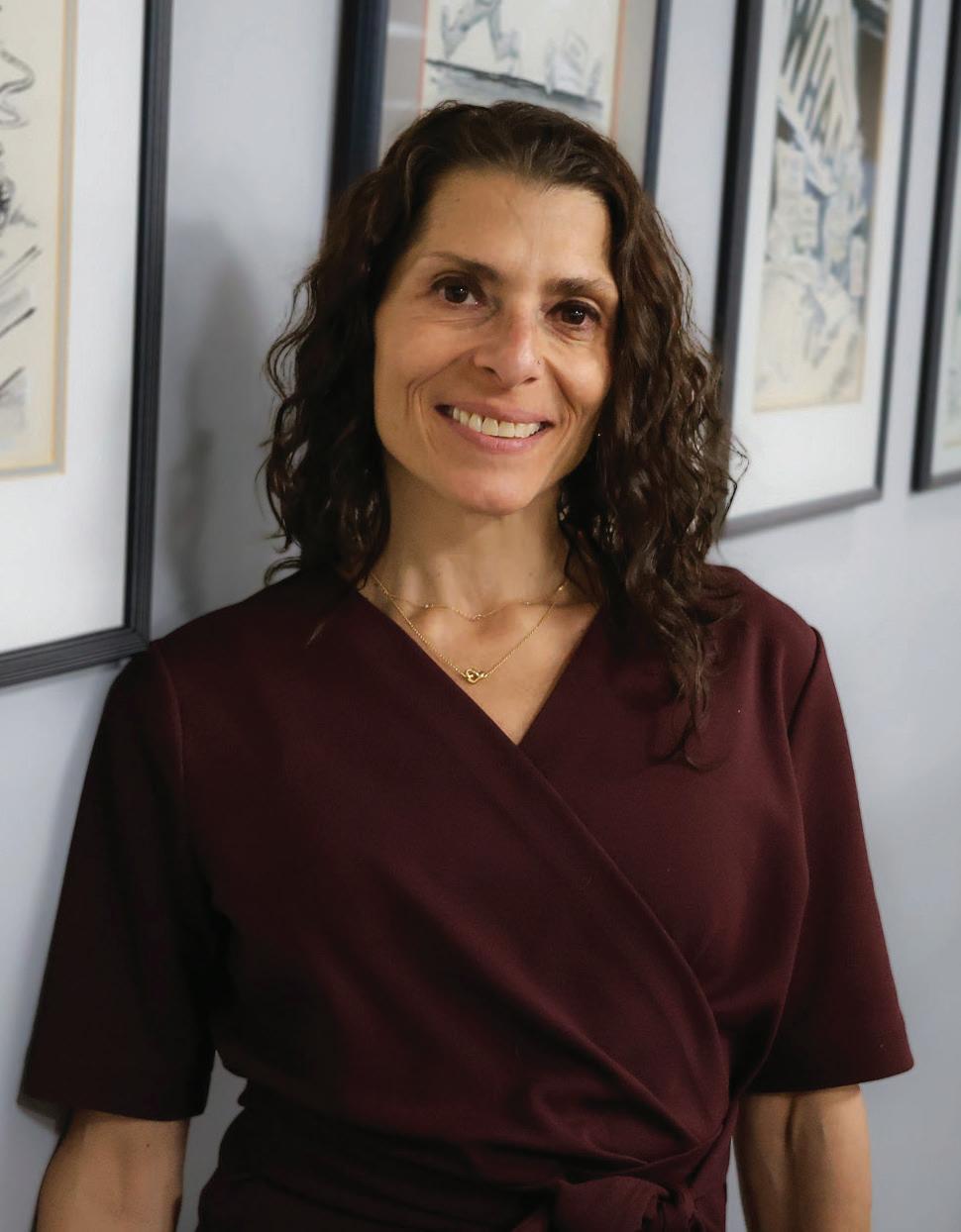
 Rachel Paras ’04
Rachel Paras ’04
When people ask me what I love most about working at my alma mater, I always answer, “The students!” And it’s so true. St. John’s Law students are fabulous. But, just adjacent to that first love is this one: I love that, when it comes to bar exam preparation, we’re doing things that no other law school is doing. That innovation is reflected in a bar passage rate that’s consistently above the New York and national averages.
Uniquely, at St. John’s, bar prep is integrated into the curriculum. As Senior Director of Bar Preparation, I reach out to 1Ls to share how we help students succeed on the New York Bar Exam. In their second year, we identify students who benefit from taking our Advanced Analytical Skills course. We also offer an Advanced Contracts course taught by my colleague, Professor Bob Ruescher. Then, as 3Ls, selected students build more knowledge and skills in the Applied Legal Analysis course I teach with other adjunct faculty members.
I’m fortunate that the Law School leadership has given me a lot of room to develop the program. Students tell me how much they appreciate the support they get through the years and in the months leading up to the bar exam. I call that final stretch “bar prep season,” and it’s a busy one. We offer multiple workshops and a two-week Bar Prep Boot Camp. I also email the students regularly and monitor their study progress online as an added layer of accountability.
But it’s not just about studying. As they prepare for the bar exam, we give our students lunch and dinner at the Law School. Generous alumni help to fund those meals, which our faculty, administrators, and staff serve, along with words of encouragement. It’s a community effort. We’re all in on it, telegraphing to our students that this person you may or may not know, who does a job that you may or may not know they do, is here to help you. That’s our culture, and it’s the greatest thing in the world.
I’ve been part of the Rittenberg Law Library team for almost five years. One of the many things that sold me on St. John’s is that there’s a real desire here for the law library to be integrated into the life of the Law School. That’s music to my ears.
With seven full-time members, we’re a small and collaborative library team. We’re as eager to help students who are working on scholarly writing projects as we are to help faculty who are developing new course materials and alumni who are identifying important pieces of St. John’s Law history. So, fundamentally, we’re connected to every part of the Law School community.
That connectivity is key. As we built our nimble and capable library team, delivered services from a distance during the pandemic, and envisioned the library’s future, questions about how we connect and how we communicate were always at the forefront. They still are today. It’s not just, “Here is a list of our services, which one would you like?” We look at where folks need to be and what information will help them get there. Legal information is really the focus of our work. It’s also where our profession intersects with technology. As librarians, we figure out which technologies are going to help us make connections between people and the information they seek.
Along with the technology we rely on and the wider world around us, this profession is constantly changing. One of the things I appreciate most about St. John’s Law is the room we’re given to embrace that change. I’ve been offered what library directors really desire: a seat at the table and a voice in conversations that impact how we provide library services and teach legal research. Being part of the executive staff, and having opportunities to collaborate with my faculty and leadership colleagues, is incredible. It makes innovation easier because I get to communicate with others who are doing things well. And that’s where inspiration arises, and exciting new ideas happen!




My work at St. John’s Law has always been student centric. About six years ago, I started here as a counselor in the Career Development Office. Moving into another student-facing role, I became Senior Director of Student Services soon after the pandemic shut down. Today, I lead the Law School’s wonderful Student Services team as Associate Dean.
Our team includes Associate Directors of Student Services Melissa Kubit Angelides, Kristina Ebanks, and Kristie Stack. Katy Piper, our Senior Director of Academic Achievement, helps students optimize their performance at St. John’s Law. Rounding out the team is Law School Counselor Tanya Weekes, who offers programs and services to support students’ mental health and wellbeing. Together, we help to shepherd students from their arrival at St. John’s through graduation.
We’re the first responders when students face health issues, family emergencies, and other challenges. We advise students on selecting courses and fulfilling degree requirements, and we oversee the Student Bar Association and its constituent, student-led groups. Then there are programmatic duties, like planning and producing our 1L orientation program, coordinating campus move-in days, supervising final exams, and managing the 1L journal writing competition. We also produce student wellness initiatives and activities.
A common denominator of all we do is ensuring that students feel heard. I’m a true New Yorker. I’m task oriented. I like to fix things. For me, this work has been a real learning journey. Sometimes students are looking for a solution to a problem. But other times they just want to vent. My team and I are here to listen, no matter what brings a student in the door.
In this way, as a team, we try to model what it means to be a service-oriented professional. I think, if we’re doing it right, student service is a lot like client service: you’re responding to emails, making yourself available, demonstrating that you take what students say seriously, and following up as needed. My hope is that students learn from us how to best serve others and then carry that lesson forward.
My role in the Law School’s senior administration is unique in its sharp focus on how we care for students and meet them where they are. Another way to look at it is this: As Vice Dean for Student Success, I’m here to make each student’s experience at St. John’s Law the best it can be for them as a total person—for who they are.
Our awareness of students as more than just bodies in seats had been growing for some time. Then the pandemic hit, and we got to know our students in such a different way. We saw that we were silly to think that they can make law school their whole lives. They can’t, since they have families, and money concerns, and life experiences, and health problems, and so many other things going on. So, now it’s my job to think about what might be impacting our students on their law school journey.
I don’t do that job alone. I work with our Vice Dean for Academic Affairs to get a view of students inside the classroom. I also work closely with our Associate Dean for Student Services, who often sees students who are struggling. Working with our Assistant Dean for Diversity, Equity, and Inclusion, we think about students who might not feel as comfortable at St. John’s Law as students from more privileged backgrounds. And I work with our Associate Dean for Career Development and Externships because we’re here to help students succeed, and getting your first job is a success milestone.
I often tell our 1Ls, “This isn’t a lawyer factory. There isn’t some mold that we’re trying to fit you into. The question is, ‘what does being a lawyer look like for you?’ That should be determined by all of the things you bring to the vocation as your whole self. You can succeed as a lawyer, and as a law student, in so many ways. Finding success on your terms is the journey, and we’re here to help you along the way.”
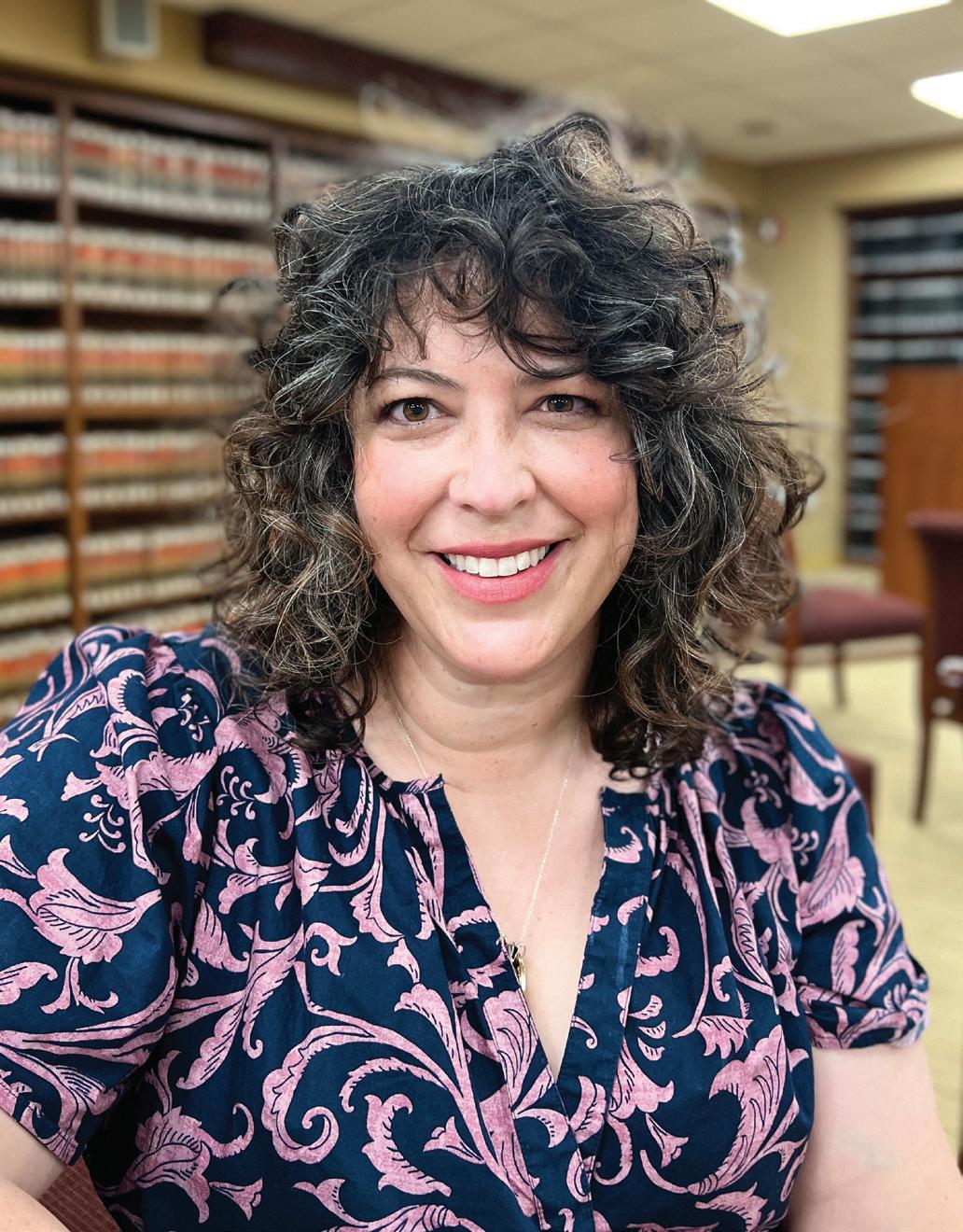

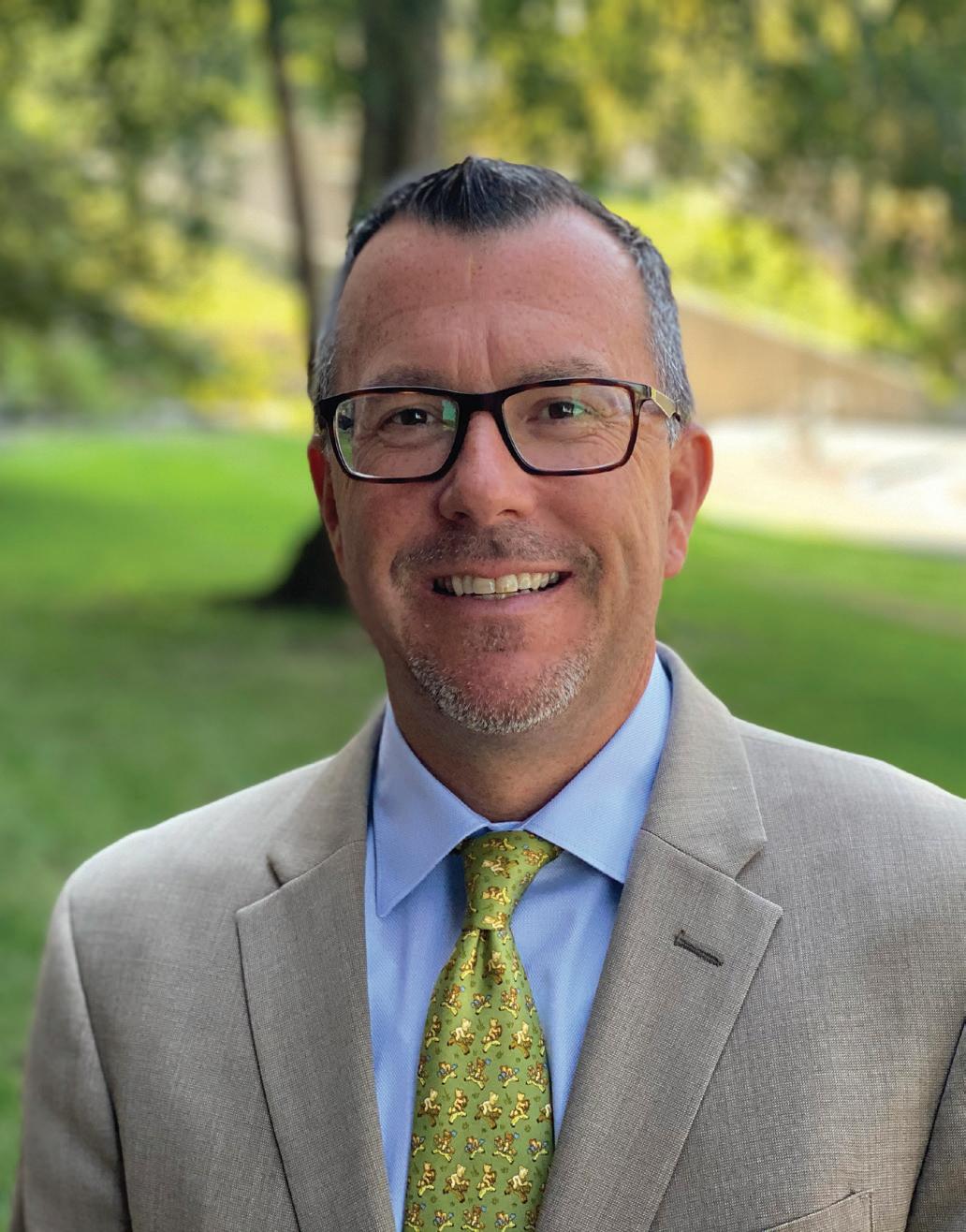
 Brian Woods
Brian Woods
St. John’s Law takes a holistic approach to alumni engagement and philanthropy that sets us apart from other law schools. It makes my job leading our Office of Development and Alumni Relations fun and challenging.
We always have a lot of balls in the air. For example, we do a few donor-related events. But most of our events aren’t solely focused on donor engagement. They’re about alumni engagement. We see, speak with, and visit a wide range of alumni. That’s intentional, and it’s propelled our success as we partner with alumni to raise funds for important causes—like student scholarships and fellowships—and to help the Law School, and our students, thrive.
That help comes in many forms. We connect alumni who have hiring needs to our Career Development Office and to students looking for full-time work, internships, or externships. When alumni refer prospective students to us, my team collaborates closely with our Admissions Office to guide them. We assist the Law School faculty as they involve alumni with our academic centers, and we work with student groups to engage alumni in their events.
We also partner with graduates who support alma mater by serving on the St. John’s Law Alumni Association Board of Directors, our most important volunteer group. All of our graduates belong to the Alumni Association. There are no dues, and we create connections around members’ shared interests, identities, and locations worldwide. More recently, the Alumni Association’s Alumni of Color Chapter, First 10 Chapter, and Alumnae Leadership Council Chapter have engaged even more volunteers who contribute their time, talent, and treasure generously.
As my team and I have worked with alumni through the years, we have witnessed their impact. When I started at St. John’s in 2012, there were about 75 endowed scholarships benefitting our students. Now there are more than 180, and all of them are unconditional and can’t be forfeited. That’s just one measure of our success. Our signature approach to alumni engagement effects positive change schoolwide, and sets a strong foundation for us to build on going forward.
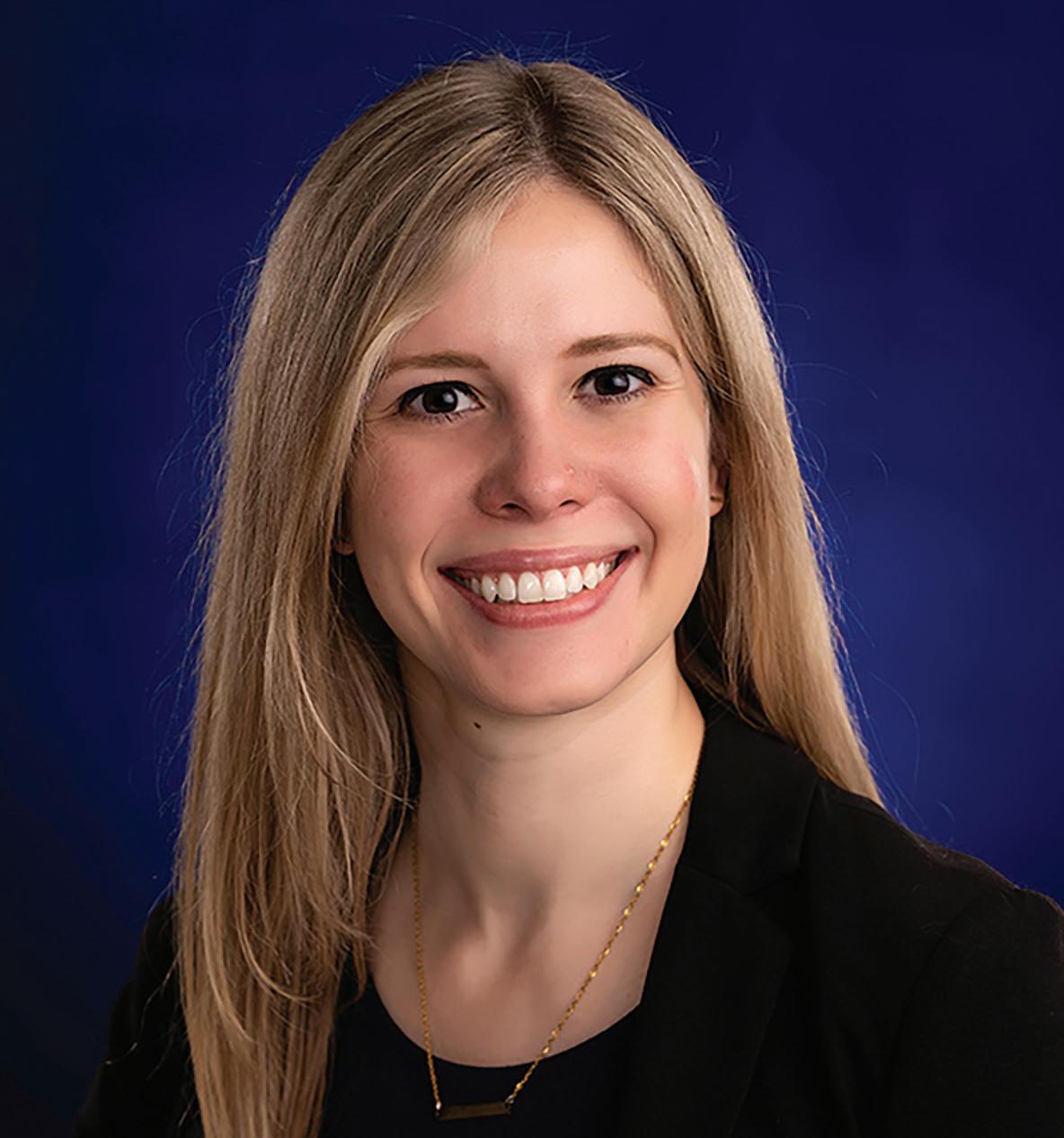
Good afternoon, Your Honors, and may it please the Court. Kayla Hardesty, Cortland County Public Defender’s Office, for the appellant, Michael Bay.
With that brief introduction, Kayla Hardesty began her first-ever oral argument before the New York Court of Appeals in People v. Bay, a criminal matter she had handled since its inception. In under an hour, she would deftly make the case for overturning the lower court’s order and getting the accusatory instrument against her client dismissed because the prosecution failed to meet its discovery obligations.
When the Court issued a unanimous decision for her client, it was a professional milestone for Hardesty, who has served as a public defender for the better part of a decade. It was also—and remains—a cause for celebration among proponents of discovery reform in New York. “The Court’s decision in Bay is a major victory for transparency in our criminal system, a vindication of the state legislature’s 2019 discovery reforms, and a rejection of the gamesmanship culture that denied the accused critical evidence against them,” says Professor Marty LaFalce, a former public defender who directs the Law School’s in-house Defense and Advocacy Clinic. “I’m thrilled that Kayla Hardesty, a St. John’s Law alumna, played such a critical role in litigating the case.”
Reflecting on her hard work on Bay, Hardesty says: “It was an amazing experience. I devoted an enormous amount of time and effort learning the process, drafting the brief, and preparing for the argument on appeal. I was lucky enough to receive assistance with the entire process from attorneys in the New York State Office of Indigent Legal Services—Statewide Appellate Support Center, who were incredibly knowledgeable and supportive. I felt that the law was on our side, so I’m excited that we now have precedent on the topic.”
Dedication to her clients and to the work of public defenders is a hallmark of Hardesty’s career, which got its start at St. John’s. She was an active member of the Frank S. Polestino Trial Advocacy Institute (PTAI) and she interned at Queens Defenders during her 2L summer. “That internship and my participation in PTAI made me realize how much I love litigation and defending the rights of others, particularly those who are indigent and may not have access to as many resources as others,” she says, adding, “It’s really rewarding to be able to stand up for the Constitution and help people at the same time.”
Hardesty’s summer internship led to a full-time position with Queens Defenders after graduation. It was a formative experience. “I learned so much being in court, drafting motions, and doing hearings and trials,” she shares. “I also had amazing supervising attorneys and coworkers who I still keep in contact with. I believe starting off my public defense career in such a diverse, high volume atmosphere like Queens was the best preparation I could have received, and I’m so thankful that I was able to work there.”
Years later, when Hardesty took a job with the Cortland County Public Defender’s Office, it was a homecoming of sorts for the Upstate New York native. It didn’t take long to acclimate to her new role. “Working in a small public defender’s office in a small area like Cortland is quite different from my prior experience at a large, New York City public defender’s office,” she says. “It’s a different pace and volume, but because we have fewer attorneys, the caseload is similar and the types of criminal cases we defend—misdemeanors, felonies, violent felonies— are similar. At a smaller office, attorneys are able to get more experience handling different areas of law, like family court, special proceedings, and appeals, which is what I enjoy most about my current role.”
With a clear passion for her vocation, Hardesty offers this advice to St. John’s aspiring public defenders: “If you push yourself to do new things that you’ve never done before and put in the time and effort, you may be surprised with how much you can accomplish. Getting hands-on experience doing trials—even mock trials—is excellent preparation for a career as a public defender. You can get that type of experience through the Defense and Advocacy Clinic, trial advocacy courses, PTAI, and internships. The knowledge and skills you build will be invaluable, as they have been for me as I’ve forged a career path that is incredibly fulfilling.”

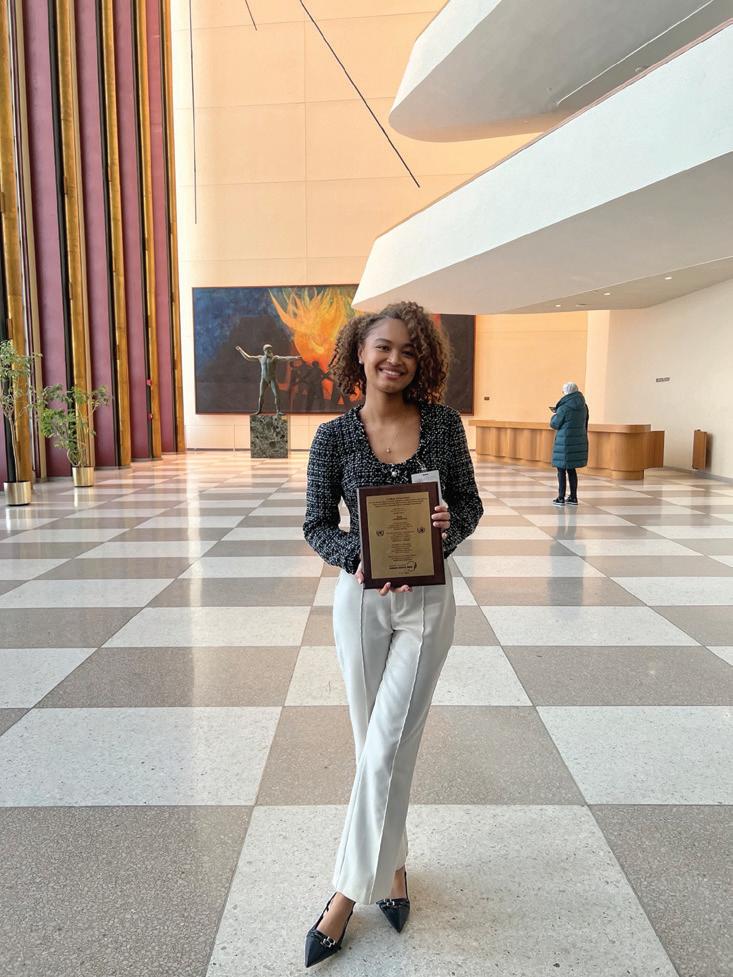
n December, joining a distinguished group that includes Malala Yousafzai, Nelson Mandela, and Martin Luther King Jr., St. John’s Law student Samia Shell received the UN Human Rights Prize. She was one of six representatives who accepted the 2023 Prize on behalf of the Global Coalition of Civil Society Organizations, Indigenous Peoples, Social Movements, and Local Communities for the Universal Recognition of the Right to a Clean, Healthy, and Sustainable Environment (the Global Coalition).
Samia’s love for the environment bloomed as a child exploring the Chesapeake Bay and grew while she studied environmental science at St. John’s University and
volunteered as a member of the Youth Constituency to the UN Framework Convention on Climate Change. Her volunteer work led to her involvement with the Global Coalition, which unites over 1350 civil society organizations, Indigenous Peoples, social movements, and local communities worldwide as they advocate for the human right of everyone, everywhere, to a healthy environment.
“As a member of the Global Coalition, among other efforts, I’ve organized, moderated, and delivered interventions for numerous events focused on the roles of youth, civil society, governments, lawyers, and businesses in recognizing and implementing the right to a healthy environment,” Samia says. “I also helped to launch the General Comment No. 26

with special focus on climate change and provided recommendations to the UN Committee on the Rights of the Child on the right to a healthy environment.”
Complementing her work with the Global Coalition, Samia built knowledge and skills as a Policy/Media Adviser for the Permanent Mission of Vanuatu to the United Nations, where she supported the Republic’s campaign to petition the International Court of Justice for an advisory opinion on climate change. Together, her initiatives in the field provide a strong foundation for Samia’s studies at St. John’s Law. “I’ve particularly enjoyed courses in International Law, International Environmental Law, International Trade Law, Civil Rights & Civil Liberties, and Administrative Law, which are all relevant to advocating for environmental justice in domestic and international contexts,” she says.
Outside the classroom, Samia has gained legal experience hands on through summer internships with the Environmental Protection Agency and in the White House Counsel’s Office. As a member of the Law School’s New York International Law Review, she completed a note titled, “A New Horizon: The Right to a Healthy Environment and Climate Change at the World’s Highest Court.” “The extensive research and writing process has given me more effective tools to use in advocating for the right to a healthy environment and what I call the ‘unspoken assumption’ of environmental justice,” Samia shares. “It’s also helped me to imagine a future where courts can use the right to a healthy environment to ensure a livable climate and clean environment for everyone.”
As she finishes her final semester at St. John’s Law, Samia looks forward to continuing her environmental advocacy. Reflecting on the UN’s recognition of that vital work, she says: “This honor has really touched me deep in my core and brought to the forefront a range of emotions. To have this historic opportunity to accept the UN Human Rights Prize on behalf of the Global Coalition has reaffirmed my belief that I have a duty to advocate for human rights and the environment. It has made me feel strong in my purpose, even more confident in my skills, ideas, and voice, and excited to optimize my legal career. It has also renewed my belief that when people bring together their strengths, perspectives, and experiences, we can collaborate effectively and with kindness to achieve a shared goal.”
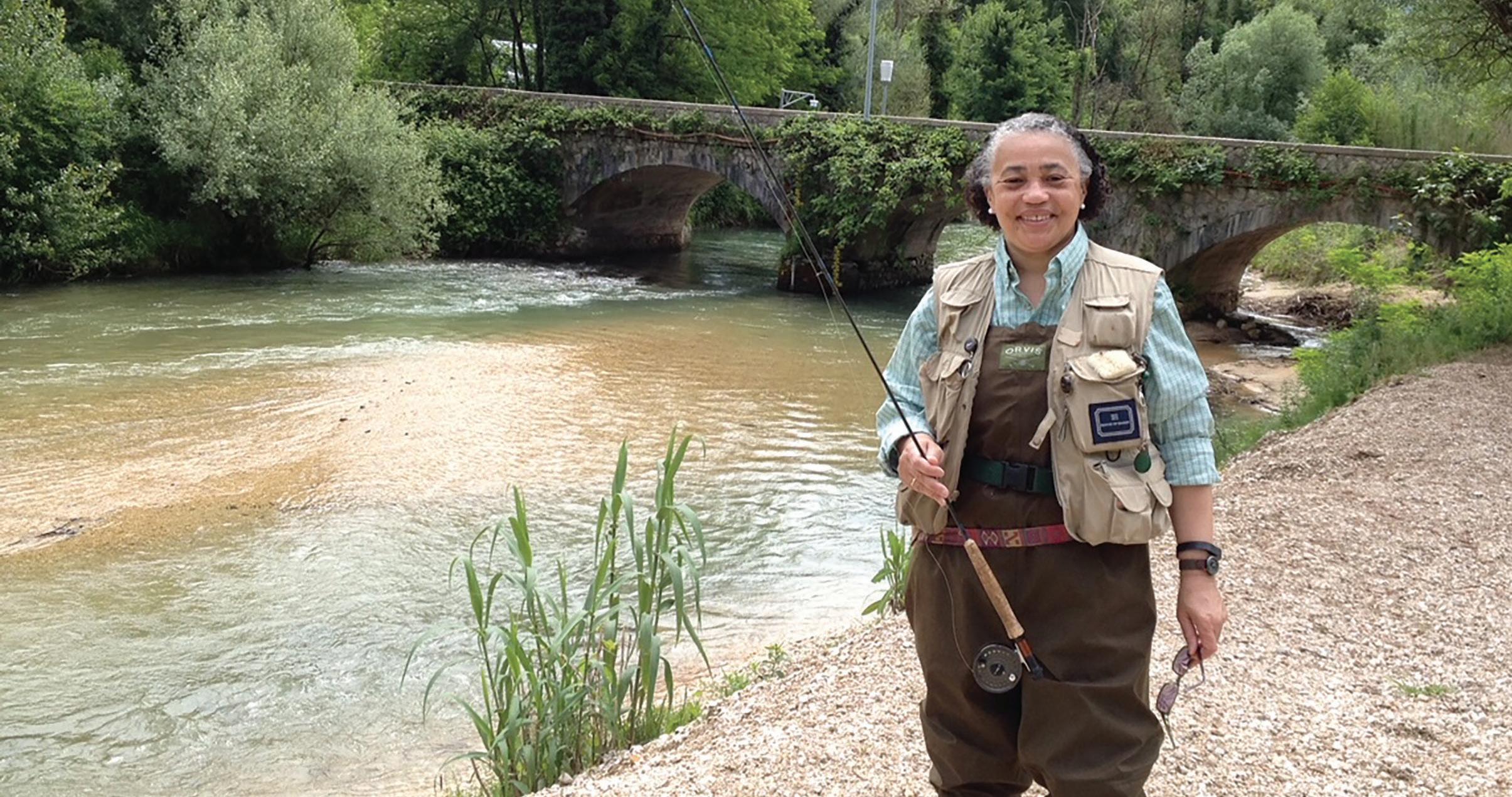
In November 1994, Janice Robinson packed her fly rod and reel and traveled to Drakensburg Mountain, South Africa, one of the world’s premier fly fishing locations. It was a transformative time. Just seven months earlier, anti-apartheid activist Nelson Mandela had become the country’s first democratically elected president.
“We stayed at a fishing camp owned by Afrikaners,” Robinson says of that memorable trip. “They weren’t prepared to host a Black American, and a woman no less. But soon enough we were connecting over the day’s catch and swapping fish stories at dinner.” All these years later, Robinson’s experience in South Africa serves as a lasting reminder of why she loves to fly fish. “The streams have the power bring people together,” she shares.
Some 8,200 miles from South Africa lie the dense mountains, tranquil valleys, vibrant wildlife, and pristine rivers of the Catskill Mountains, where you can often find Robinson today. She has a small home in the region, which is considered the birthplace of American dry-fly fishing, an angling technique employing an artificial fly that floats on the surface of the water. “When I was a child, my
father taught me to fish in the Long Island Sound,” Robinson recalls. “After graduating from St. John’s Law and starting my career as a Legal Aid attorney, I yearned for respite outside the city. Reading up on fly fishing, I taught myself how to cast, took some lessons, fell in love with the sport, and eventually earned a New York State lifetime fishing license.”
Robinson’s passion for fly fishing intertwines with her professional life, which has taken her from law practice to the field of higher education. She is now Vice President for Diversity and Community Affairs at Teachers College, Columbia University’s graduate school of education, health, and psychology. “The ability to concentrate, to listen carefully to others, and to genuinely be open to learning new skills—or sharpening old ones—is a constant with fly fishing,” Robinson explains. “I try to apply that in my professional life. I also strive to bring the patience that more experienced fly fishing mentors have with me to my work in the classroom as an Associate Professor of Higher Education.”
The connection between fly fishing and education is also evident in Robinson’s volunteer work with Theodore Gordon

Flyfishers, a conservation and education organization where she serves on the board of directors and co-chairs the Education and Founders Fund scholarship committees. The scholarships provide support for graduate-level or law students whose studies include ecology, conservation, or environmental law or policy. “Like the sport it represents, Theodore Gordon Flyfishers immerses its members in conservation,” says Robinson, who uses catch-and-release practices that leave fish unharmed. “Conservation in fly fishing keeps the streams clean for people and for the fish. It also provides a better understanding of the science of the flies and the movement of the water in the streams.”
As Robinson continues to inspire future teachers and fly fishers alike, she reflects on lessons she learned in South Africa decades ago. “Fly fishing has given me the ability to meet many different kinds of people from different backgrounds, who all share wonderful experiences and stories,” she says. “While the world constantly changes around us, we come together and forge enduring connections through a sport we love. It’s incredibly gratifying.”
Spokes, wheels, chains, handlebars, and brakes were the tools of Bob Gunther’s trade growing up in Valley Stream on Long Island, where he worked in his father’s bicycle shop from a very young age. The assembly of parts also gave him an introduction to a career in the law.
“When I was a senior in high school, I was deposed in a personal injury case concerning a bicycle I had put together,” Gunther says. “I found the whole experience fascinating, and it set me on a path to becoming a trial lawyer.” After earning his undergraduate degree at St. John’s University, Gunther decided to attend St. John’s Law. “I loved the atmosphere on campus, so it was a natural choice for me,” he shares.
At the Law School, Gunther excelled academically and earned a spot on the St. John’s Law Review. After graduation, staying true to his chosen path, he launched his career as a trial lawyer with a focus on intellectual property matters. Rising to partner at WilmerHale, for over 35 years he has represented a broad range of life sciences, pharmaceutical, and technology clients in IP and related litigation at both the trial and appellate levels. Among other professional accolades, Gunther was named a Fellow of the American College of Trial Lawyers in recognition of his exemplary courtroom achievements.
Schreibersdorf ’84. Over the past two decades, BDS has become one of New York City’s largest legal services providers.
Gunther also experienced the impact of work in the public interest through his son, and fellow Law School alumnus, Kevin Gunther ’17. “Kevin spent five years as a public defender at BDS, and I saw firsthand the importance of providing criminal and civil representation for those less fortunate,” says Gunther. “From him, from Lisa, and from my own involvement with BDS, I’ve learned how committed public interest attorneys can, and do, change the lives of their clients and change their communities for the better.”
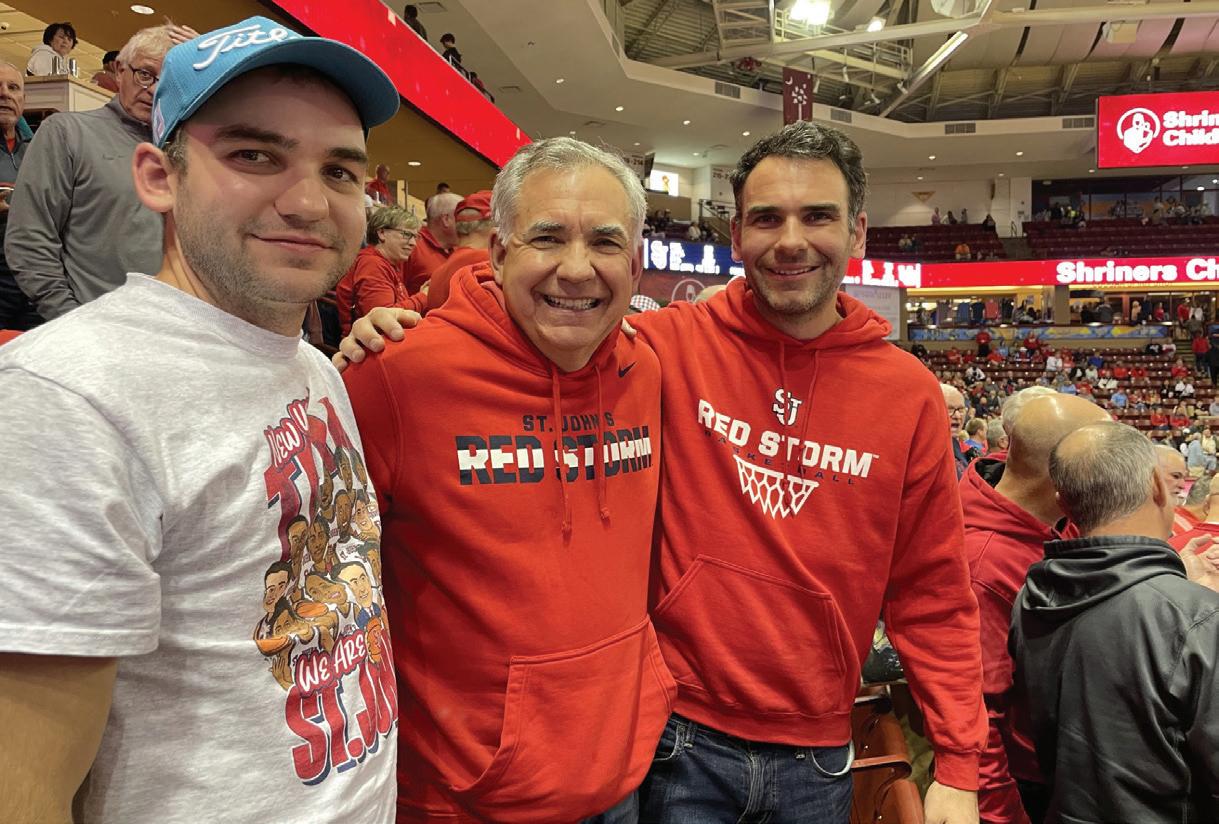
With that understanding, Gunther considers it a privilege to support the Law School’s Summer Public Interest Fellowship Program. Animated by St. John’s Vincentian mission of serving underrepresented and marginalized individuals and communities, the program provides funding to students who build practical knowledge and skills as they work in a range of public interest and public service settings. Last summer, thanks to Gunther and other generous alumni and friends, the Law School awarded 75 fellowships with a total of $431,000 in funding.
Outside the office, Gunther contributes his time, talents, and treasure generously as an active St. John’s alumnus. Taking on a volunteer leadership role, he recently completed his term as President of the Law School Alumni Association. His dedication to alma mater is just as evident when he is cheering on the St. John’s Red Storm men’s basketball team from the stands at Carnesecca Arena, Madison Square Garden, and venues further afield, along with his wife, Pat, and their sons.
Adding to his full and fulfilling life, Gunther has always made pro bono work a priority. “I’m proud to say that WilmerHale has an incredible and inspiring commitment to pro bono,” he says. “Some of the most satisfying matters I’ve been involved in have been pro bono representations.” Among other pro bono activities, Gunther serves on the Board of Directors at Brooklyn Defender Services (BDS), which was founded by his friend and St. John’s Law classmate, Lisa
Emily Trumble ’24 was one of four 2023 Summer Public Interest Fellows who, with Gunther’s support, gained invaluable experience while serving the greater good. “I came to St. John’s knowing I wanted to use my law degree to advocate for vulnerable communities as a public defender,” she says. “This past summer, I was honored to work in the Legal Aid Society’s Criminal Defense Practice. Thanks to Mr. Gunther, and because he prioritizes public defense work, I’ve been able to grow as an advocate and help those most in need during the process.”
Reflecting on the Summer Public Interest Fellowship Program, Gunther sees the foundation it sets for St. John’s Law students as they chart their legal careers. “I think there are many ways lawyers can contribute to social justice,” he says. “My particular path has involved participation on the BDS Board, a commitment to pro bono in my practice, and a financial commitment to public interest initiatives at St. John’s. Others may find more direct paths, like Lisa and Kevin. I think each of us has to find our own path, and that is just fine, so long as we all contribute in some significant way to help those less fortunate.”
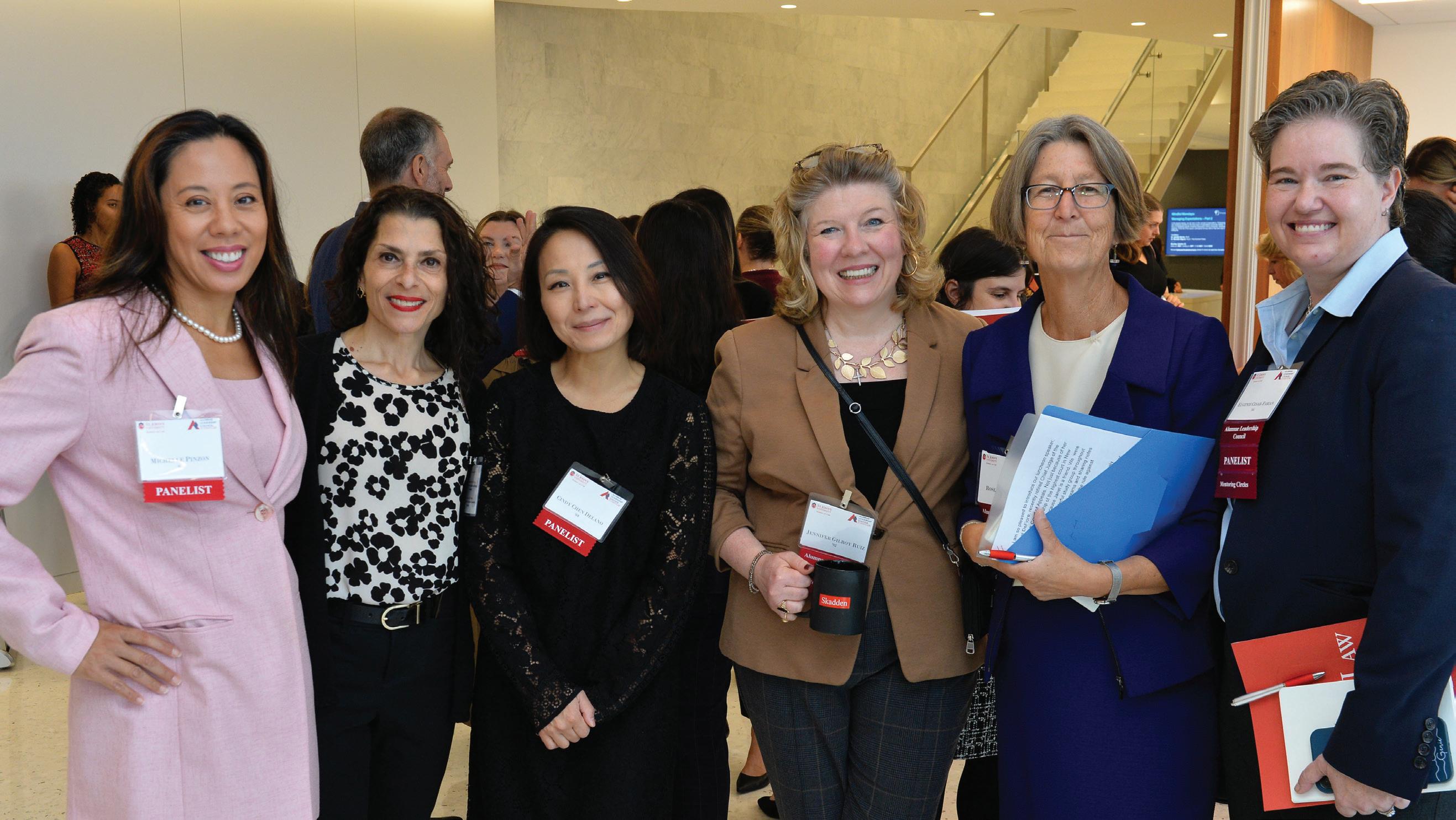
OVER 100 ST. JOHN’S LAW ALUMNAE came together for the inaugural Women’s Leadership Conference hosted by the Law School Alumni Association Alumnae Leadership Council Chapter (ALC).
With expansive views of the midtown Manhattan skyline, the offices of Skadden Arps provided a fitting venue for this special event that featured panel discussions on a range of topics, from practice, promotion, and networking to leadership, longevity in the profession, and career strategies. Alumnae working in diverse practice areas offered insights as panelists and moderators during the morning and afternoon sessions.
As a highlight of the day’s programming, Hon. Janet DiFiore ’81, ’17HON, who served as New York’s Chief Judge from 2016 to 2022, delivered remarks. She encouraged Conference attendees to lead with passion and courage, invoking strength when leadership is difficult. The event concluded with a networking reception where panel attendees, presenters, and moderators connected and conversed.
“When I arrived at the Conference, I was excited to see so many female St. John’s Law attorneys,” says attendee Ruth Calaman ’98. “It was energizing to learn from, and network with, distinguished alumnae across class years. These lawyers’ professional lives have made a profound impact on their own lives and the lives of others. From Judge DiFiore’s address to the enriching panel discussions, I was impressed with this amazing group, and was honored to be included among them.”
Founded in 2021 through the vision of Rose DiMartino ’81, the ALC provides formal and informal leadership training via mentoring, programs, and other activities and initiatives. Members share insights and tools on how women can succeed in the legal profession, with a particular focus on helping recent graduates navigate their career paths.
“The ALC has cultivated a unique and welcoming space where current students can seek guidance from alumnae and graduates can network, learn, and feel encouraged,” ALC Steering Committee member and Conference attendee Tina Kassangana ’19 says. “The Conference was impactful, showing that St. John’s Law alumnae have endless possibilities.”
Cindy Chen Delano ’04, who served as a Conference panelist, agrees. “The physical gathering of generations of St. John’s Law female leaders was striking. We, as women, often travel in our careers as exceptions, wearing our law degree as badges of honor. Using the Conference as a platform to connect with one another harnessed exponential power. Alumnae at St. John’s Law can achieve greatness together. There’s so much talent, dedication, and warmth to drive inclusion and progress.”
Many thanks to the Law School alumnae who served on the Conference planning committee, and to the panelists and moderators who volunteered their time and talents to make the event a success. To learn more about the ALC and its offerings, please contact Jeanne Mulry at mulryj@stjohns.edu.
APRIL 12
Diversity & Inclusion Gala
Tribeca Rooftop, New York, NY
Honorees: Hon. Carmen Beauchamp
Ciparick ’67, ’03HON and Valerie Capers Workman ’90
MAY 14
Law Review Alumni Reception
Metropolitan Club, New York, NY
Honorees: Cindy Chen Delano ’04 and James D. Herschlein ’85
MAY 16
BLSA 50th Anniversary Celebration
Brooklyn Chop House, New York, NY
Honoree: Former St. John’s Law
Admissions Counselor Dorothy Moran
MAY 20
St. John’s Law Commencement
Carnesecca Arena, Queens, NY
JUNE 17
Hon. Theodore T. Jones Memorial Golf Outing
Wykagyl Country Club, New Rochelle, NY
Honoree: Jonathan Sack ’89

JUNE 18
Hon. John E. Sprizzo Reception
The Players Club, New York, NY
Honoree: Richard P. Donoghue ’92
JUNE 25
Subway Series: Mets vs. Yankees
Citi Field, Flushing, NY
SEPTEMBER 16
Fall Alumni Golf Outing
Nassau Country Club, Glen Cove, NY
Honoree: Joseph Vaccaro ’98
NOVEMBER 20
Law Loughlin Donor Recognition Reception
Metropolitan Club, New York, NY
NOVEMBER 22
Supreme Court Admission Ceremony
U.S. Supreme Court, Washington, D.C.
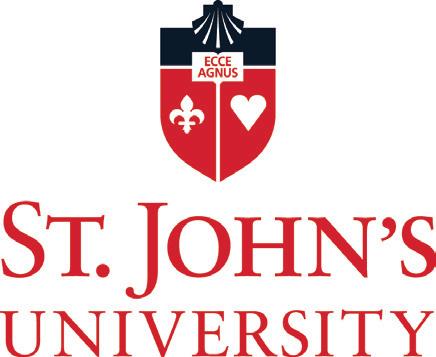

“One of the main reasons I chose to attend St. John’s Law was the extensive alumni network. Just by being a graduate of the Law School, I’ll start my career with a tremendous advantage. There’s nothing more satisfying than helping others, and as I work toward a successful career in law, I hope to provide the same kind of generosity the Class of 1982 awarded me.”
— Ryan Pugh ’24, Class of 1982 Scholarship
Use the enclosed donation envelope to support student scholarships at St. John’s Law, or give online at stjohns.edu/law/give Thank you!